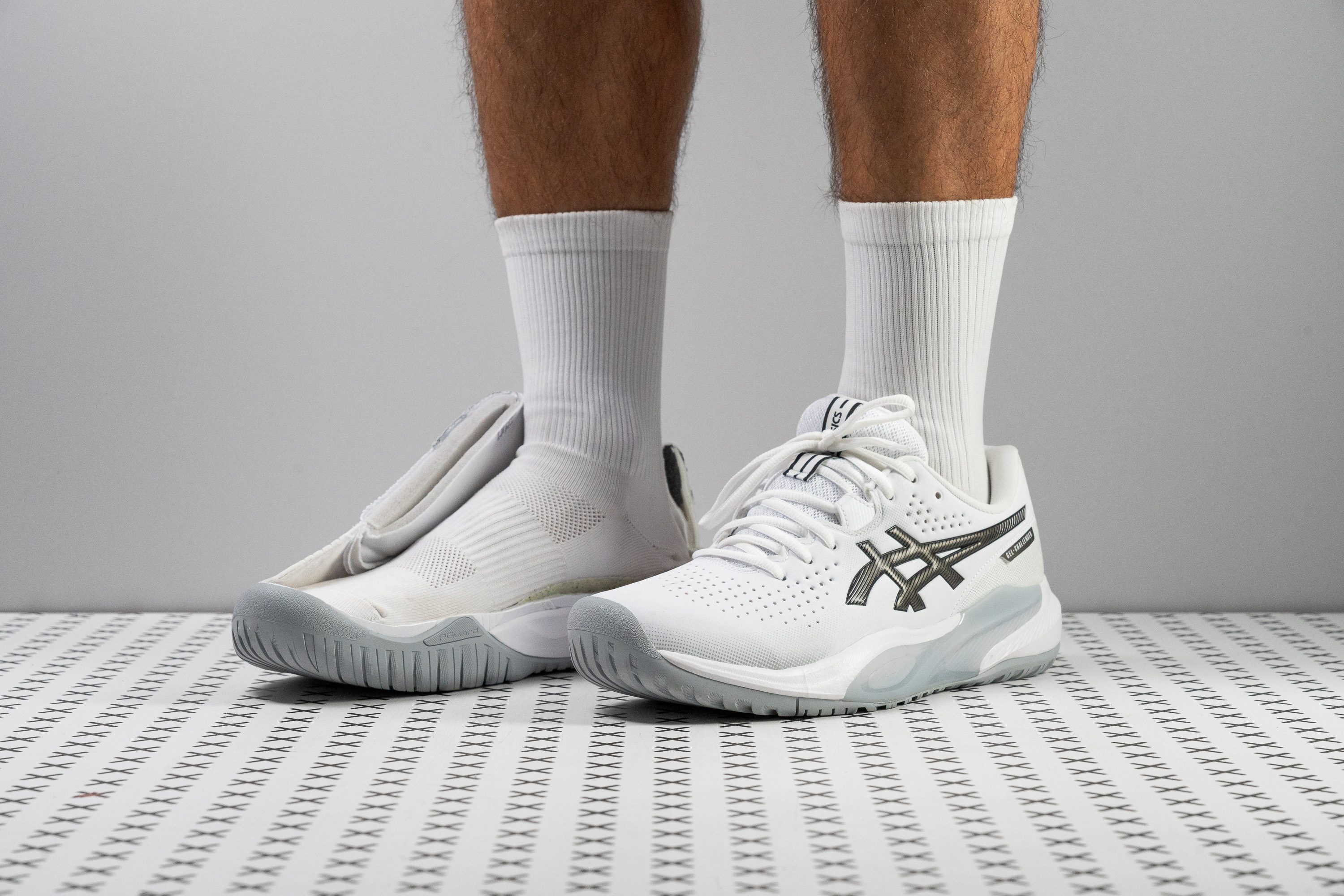Our verdict
- Top pick in best tennis shoes
- Top pick in best tennis shoes for flat feet
Pros
- Uncanny value for money
- Unbelievably stable ride
- Much wider and steadier base
- Great outsole grip and give
- Fantastic durability for the price
- Accommodating fit
- Generously padded interiors
Cons
- Massive weight gain
- Minimal shock absorption
- Not very breathable
Audience verdict
Comparison
The most similar tennis shoes compared
+ + Add a shoe | |||||
|---|---|---|---|---|---|
| Audience score | 82 Good! | 88 Great! | 87 Great! | 84 Good! | |
| Price | $110 | $160 | $160 | $170 | |
| Shoe type | Hard Court | All CourtHard Court | All CourtHard Court | Hard Court | |
| Shock absorption | Low | Moderate | Moderate | Moderate | |
| Energy return | Moderate | Low | Moderate | Low | |
| Traction | Low | High | High | - | |
| Construction | Stability | Stability | Stability | Stability | |
| Breathability | Moderate | Moderate | Moderate | Moderate | |
| Weight lab | 13.9 oz / 395g | 13.9 oz / 394g | 14.7 oz / 417g | 14.3 oz / 406g | |
| Drop lab | 9.0 mm | 11.3 mm | 8.9 mm | 10.4 mm | |
| Width / fit | Wide | Medium | Wide | Medium | |
| Toebox width | Medium | Medium | Narrow | Narrow | |
| Size | - | Slightly small | True to size | True to size | |
| Midsole softness | Firm | Balanced | Balanced | Firm | |
| Stiffness | Moderate | Moderate | Moderate | Stiff | |
| Torsional rigidity | Stiff | Stiff | Stiff | Stiff | |
| Heel counter stiffness | Stiff | Stiff | Stiff | Moderate | |
| Midsole width - forefoot | Wide | Wide | Very wide | Wide | |
| Midsole width - heel | Wide | Wide | Wide | Average | |
| Outsole durability | Good | Decent | Good | Good | |
| Heel padding durability | Good | Decent | Decent | Bad | |
| Collaboration | - | - | - | Novak Djokovic | |
| Heel stack lab | 28.5 mm | 28.4 mm | 30.8 mm | 32.2 mm | |
| Forefoot | 19.5 mm | 17.1 mm | 21.9 mm | 21.8 mm | |
| Insole thickness | Average | Thick | Average | Average | |
| Removable insole | ✓ | ✓ | ✓ | ✓ | |
| Heel tab | None | Extended heel collar | None | None | |
| Toebox durability | Good | Decent | Good | Good | |
| Outsole hardness | - | Average | Hard | Average | |
| Outsole thickness | Average | Very thin | Average | Thin | |
| Ranking | #26 Bottom 35% | #11 Top 28% | #15 Top 38% | #21 Bottom 46% | |
| Popularity | #20 Top 50% | #7 Top 18% | #5 Top 13% | #2 Top 6% |
Who should buy
You'll definitely want to check this shoe out if:
- your tennis shoe budget is limited, but you want the best possible value for money
- you want premium-level stability in a cheaper shoe
- you don't mind a heavier shoe in exchange for durability
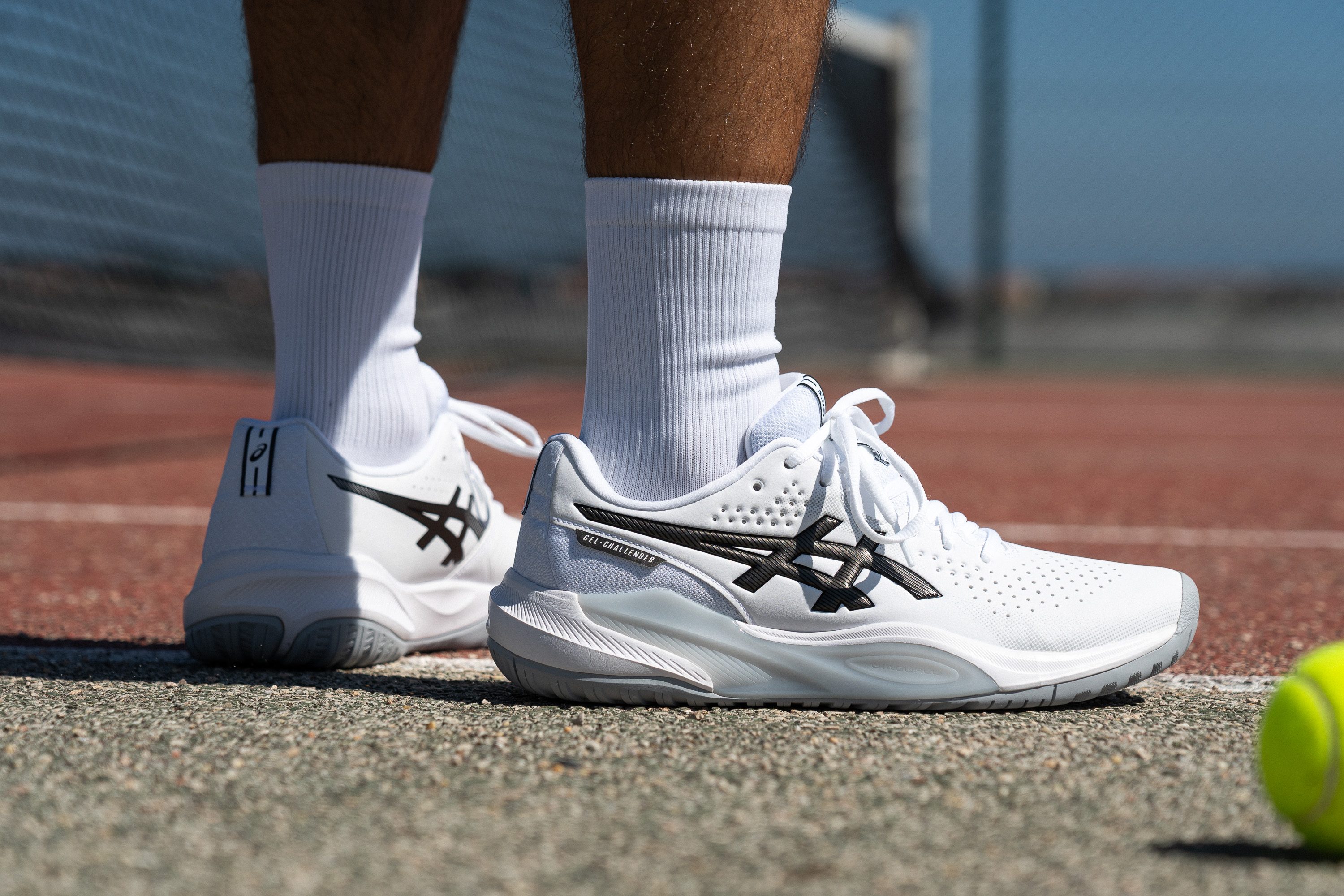
Who should NOT buy
If you are here for a lightweight and speed-oriented tennis shoe, consider the ASICS Solution Swift FF 2 or the ASICS Solution Speed FF 3 instead.
Both of these shoes also showed notably higher shock absorption results, which is better for players who rely on added impact protection for plantar fasciitis, joint pain, or any other condition.
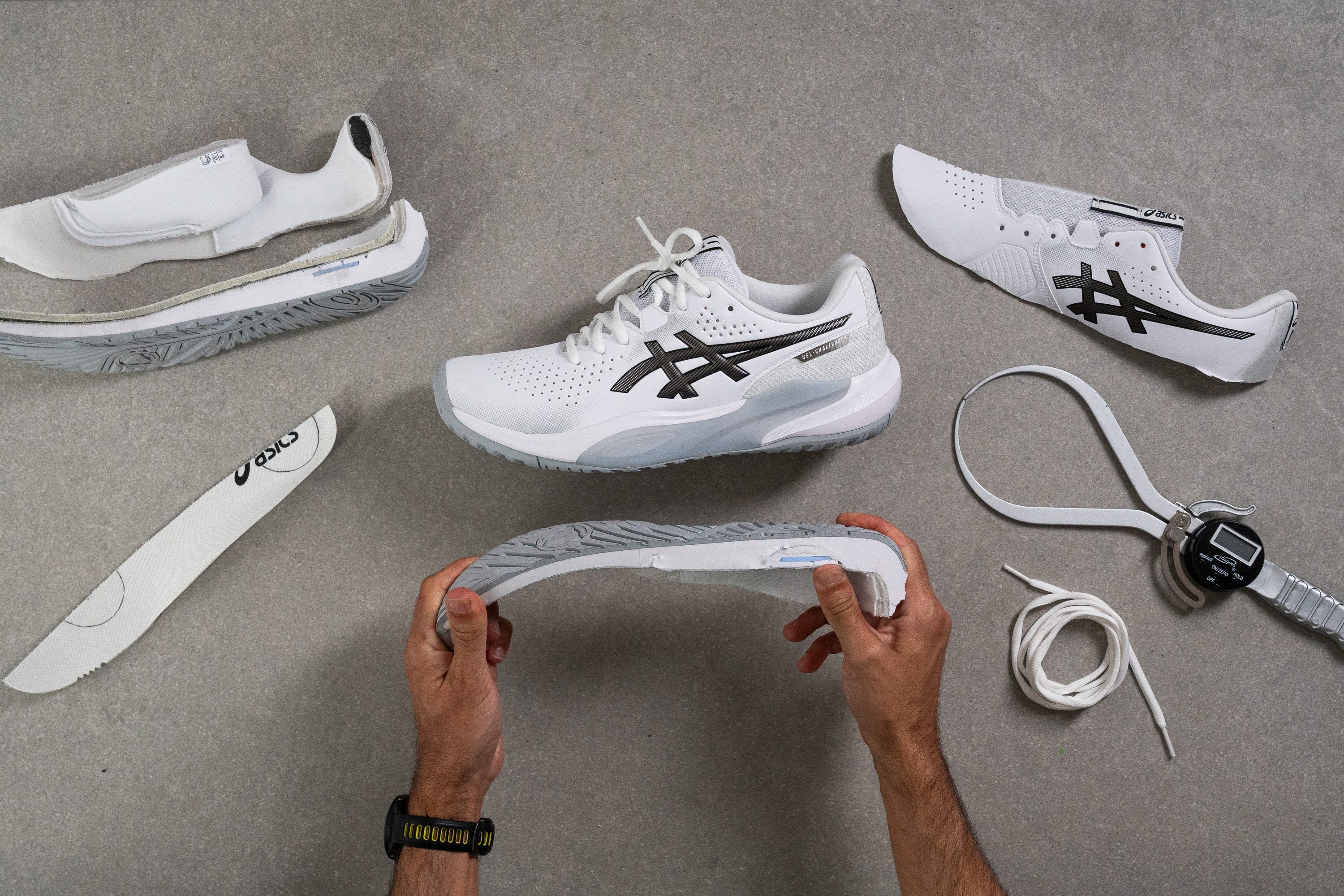
Cushioning
Shock absorption
To our surprise, the Gel Challenger 15's turn towards stability reflected in a pretty drastic shock absorption decrease compared to the v14.
While its forefoot cushioning remained practically unchanged at 67 SA, the shoe's heel got significantly less cushioned at 84 SA! This is not too low to call it out for being harsh or raw underfoot, but it is still one of the lowest measurements we've recorded among tennis shoes.
On a positive note, it ensures a more direct feedback between the foot and the court.
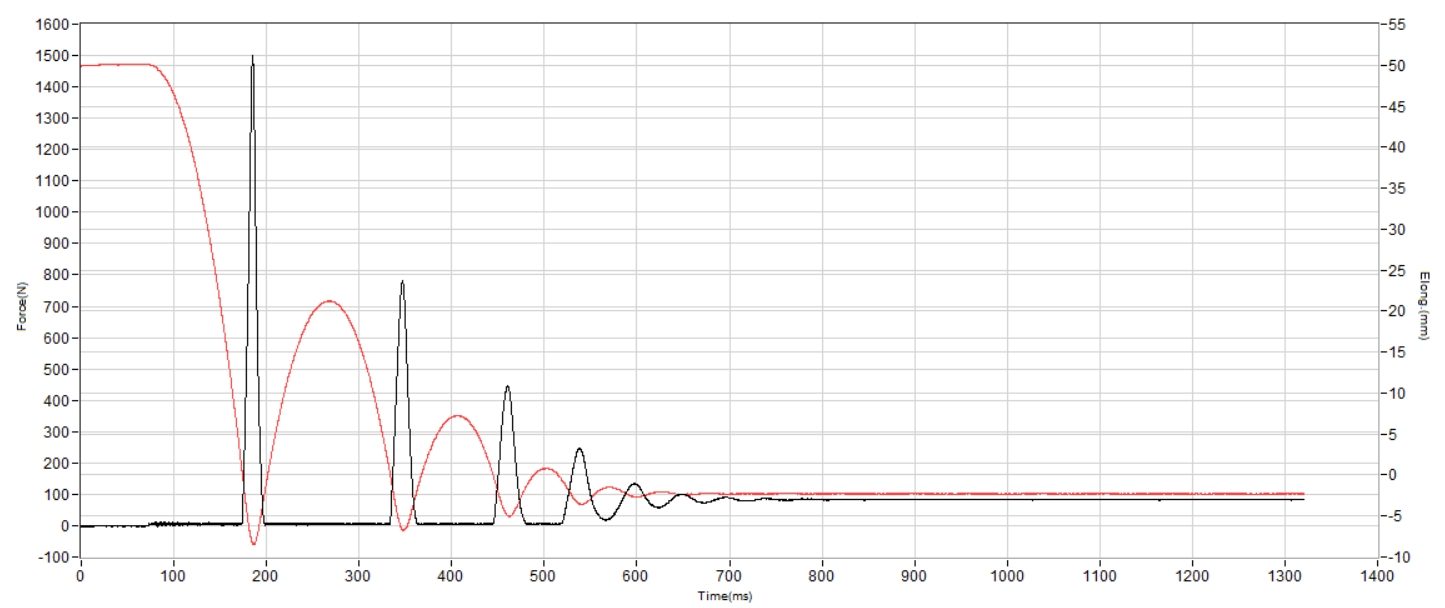
| Gel Challenger 15 | 84 SA |
| Average | 100 SA |
Energy return
The Challenger 15's midsole rebound also proved to be very minimal, with below-average energy return scores of 46.6% in the heel and 47.6% in the forefoot.
Some players may lack responsiveness in this ASICS shoe, but they will get a more stable and planted experience in return.
| Gel Challenger 15 | 46.6% |
| Average | 48.8% |
Heel stack
Measuring the shoe's heel stack at 28.5 mm, we found that it got slightly lower than the previous version (by 1.9 mm), but it is still within the category average.
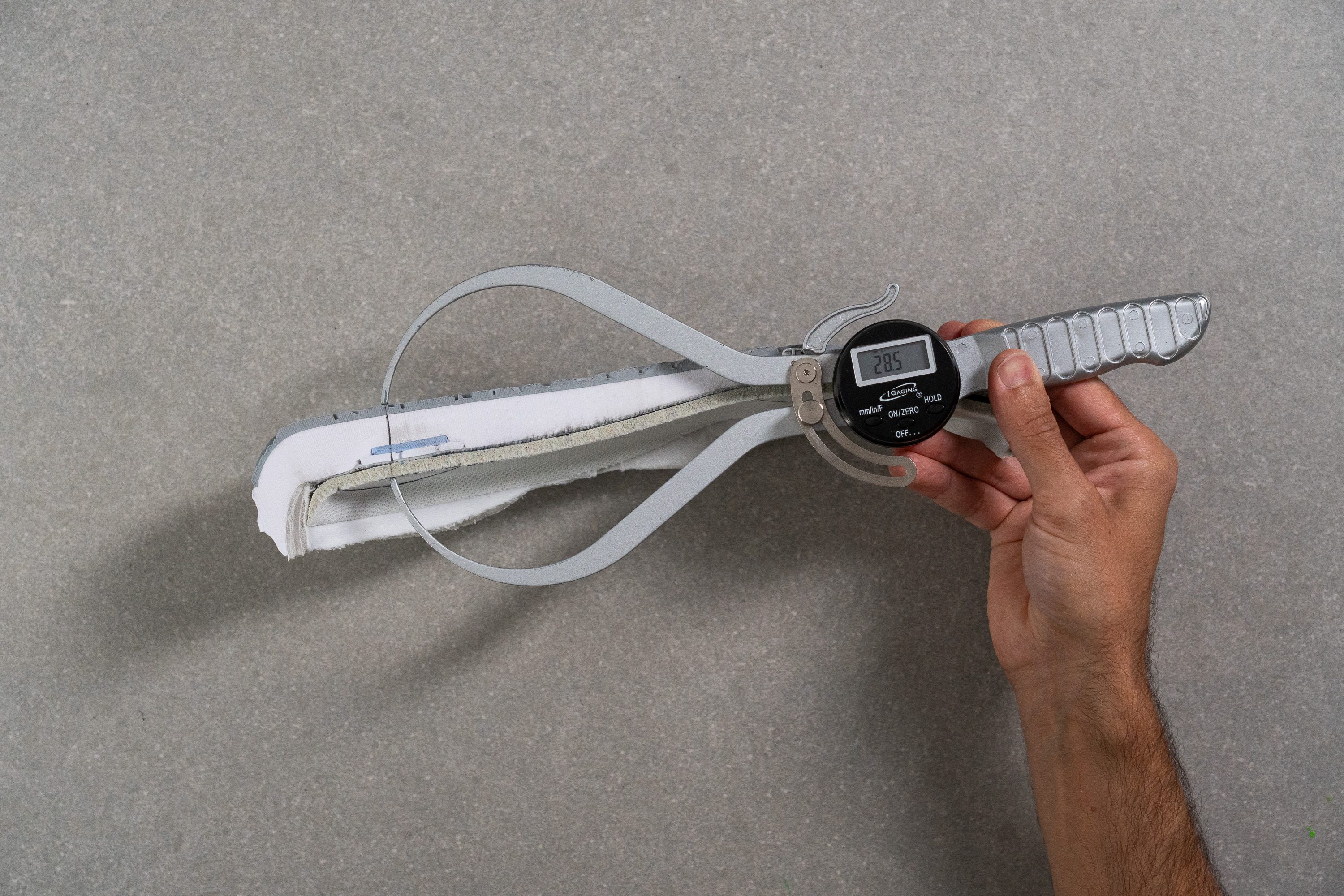
| Gel Challenger 15 | 28.5 mm |
| Average | 29.3 mm |
Forefoot stack
At 19.5 mm, the shoe's forefoot stack sits right at the average of tennis shoes. It is neither too low nor too high.
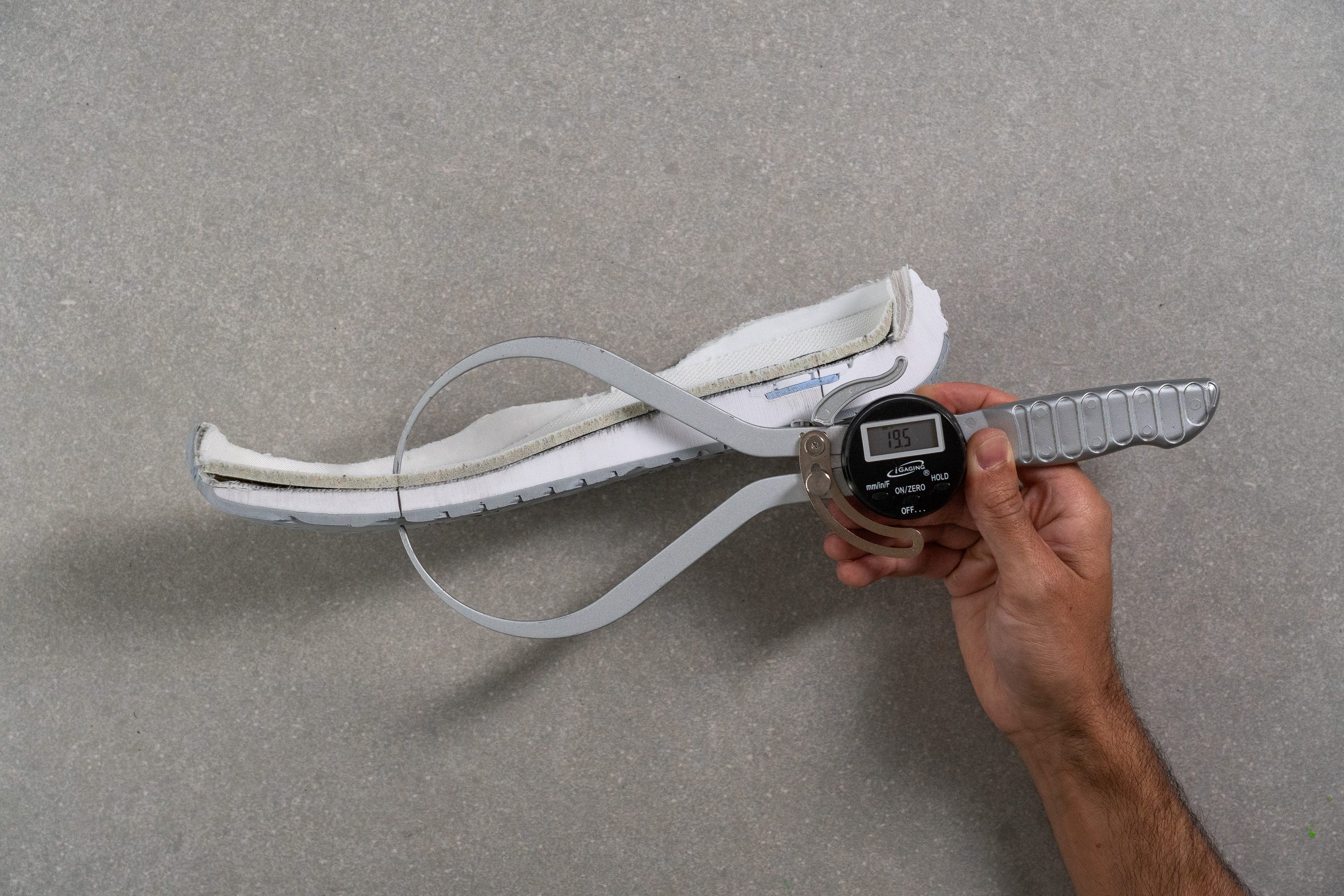
| Gel Challenger 15 | 19.5 mm |
| Average | 19.5 mm |
Drop
The shoe's regular stack heights also resulted in a regular heel-to-toe drop of 9.0 mm. It puts the heel slightly higher above the toes for a more ergonomic position, but not too high to compromise a sense of groundedness.
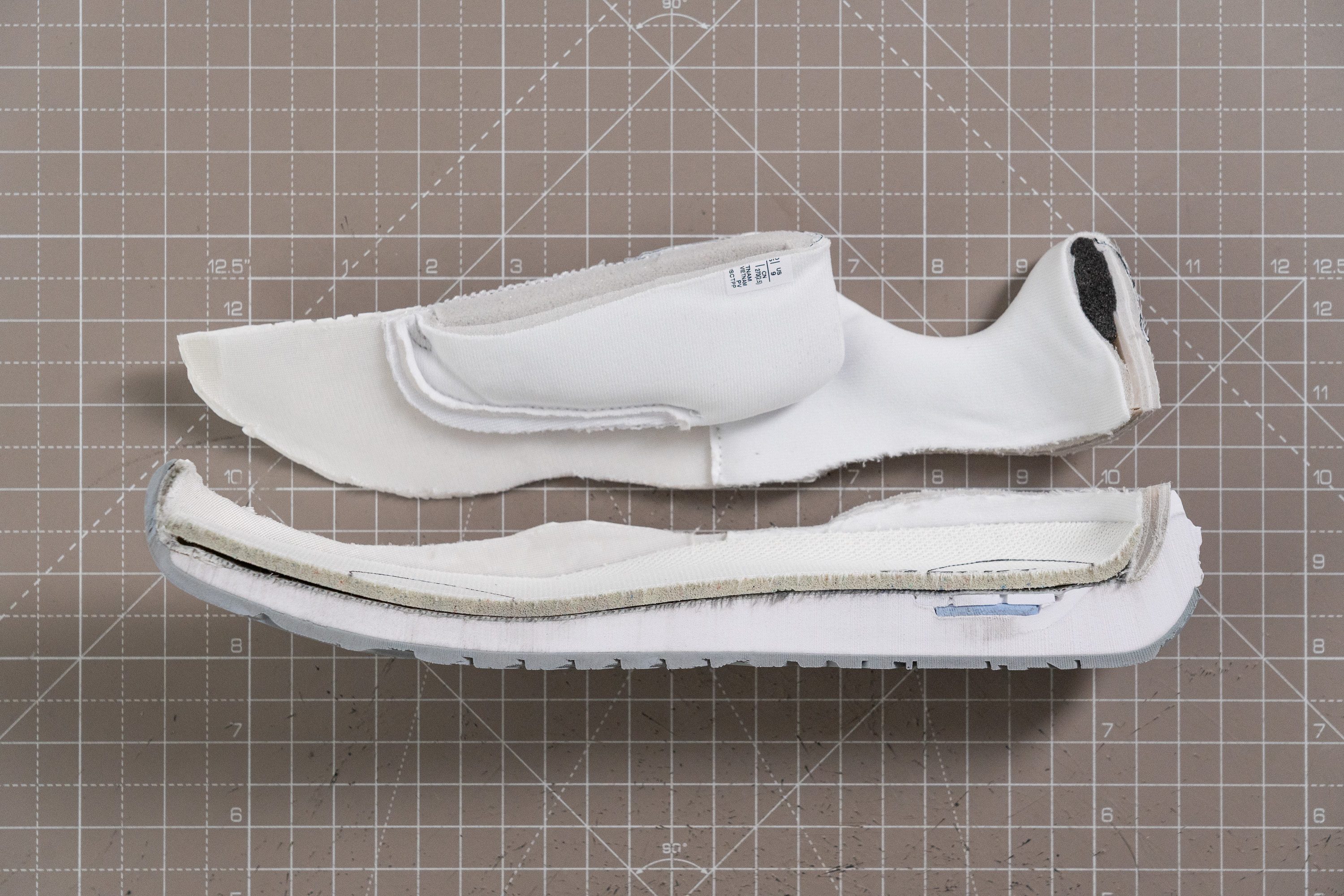
| Gel Challenger 15 | 9.0 mm |
| Average | 9.8 mm |
Midsole softness
ASICS doesn't reveal the type of foam used for the Challenger 15's midsole, but it appears to be the same firm compound as in the v14.
Pressing a durometer against it returned an above-average reading of 32.4 HA, which indicates a firmer ride and goes in line with the shoe's stability-oriented design.
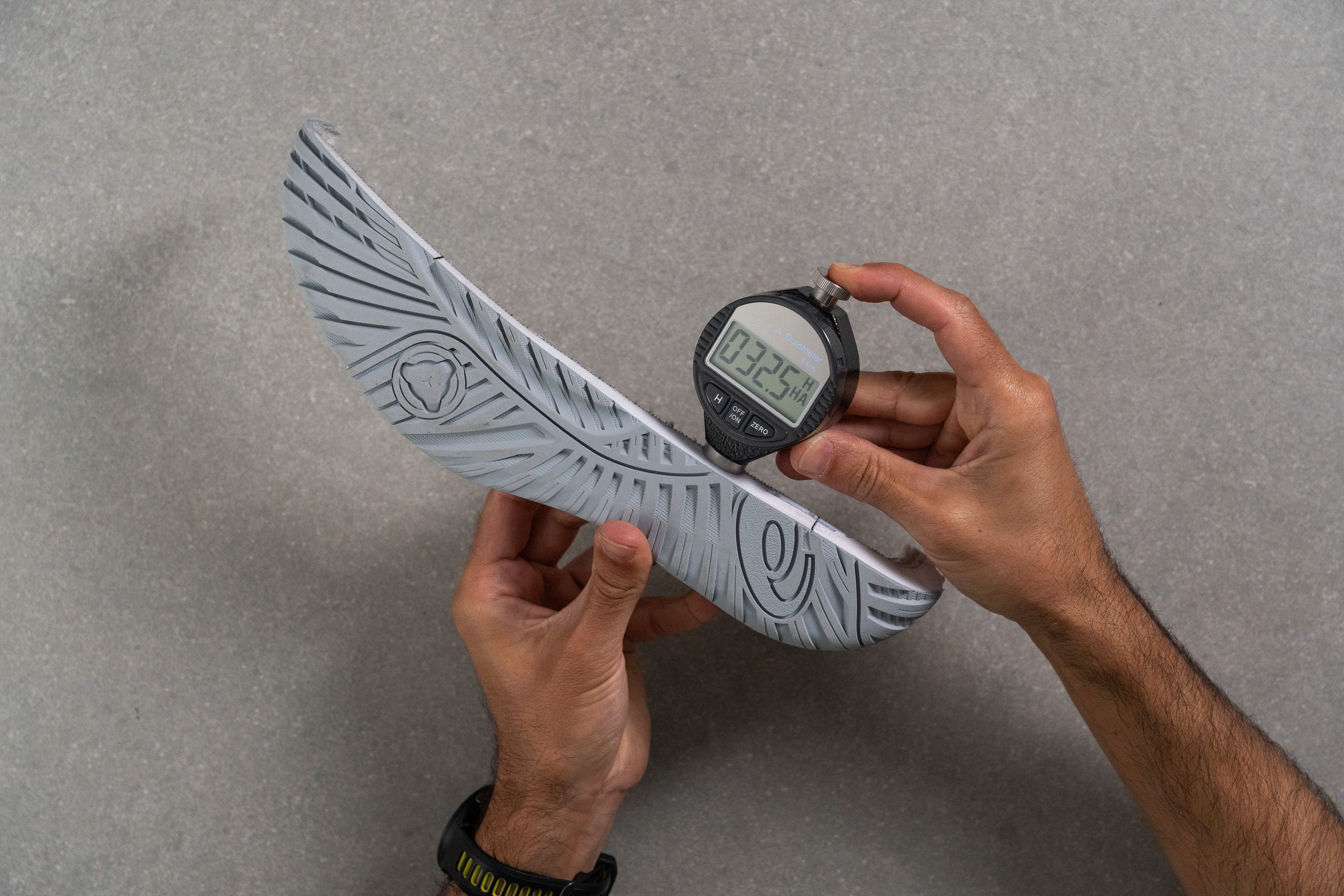
| Gel Challenger 15 | 32.4 HA |
| Average | 28.0 HA |
Size and fit
Size
Width / Fit
Our medium-width feet never felt as if they needed extra space in the ASICS Gel Challenger 15, but let's see what its gel mold has to show.
Using a digital caliper, we measured the widest part of the shoe's forefoot (between the big toe and the pinky) at 95.6 mm. This is a wide reading indeed!
Considering that this ASICS shoe is only available in one (medium) width, the extra space caters to a broader range of foot shapes.
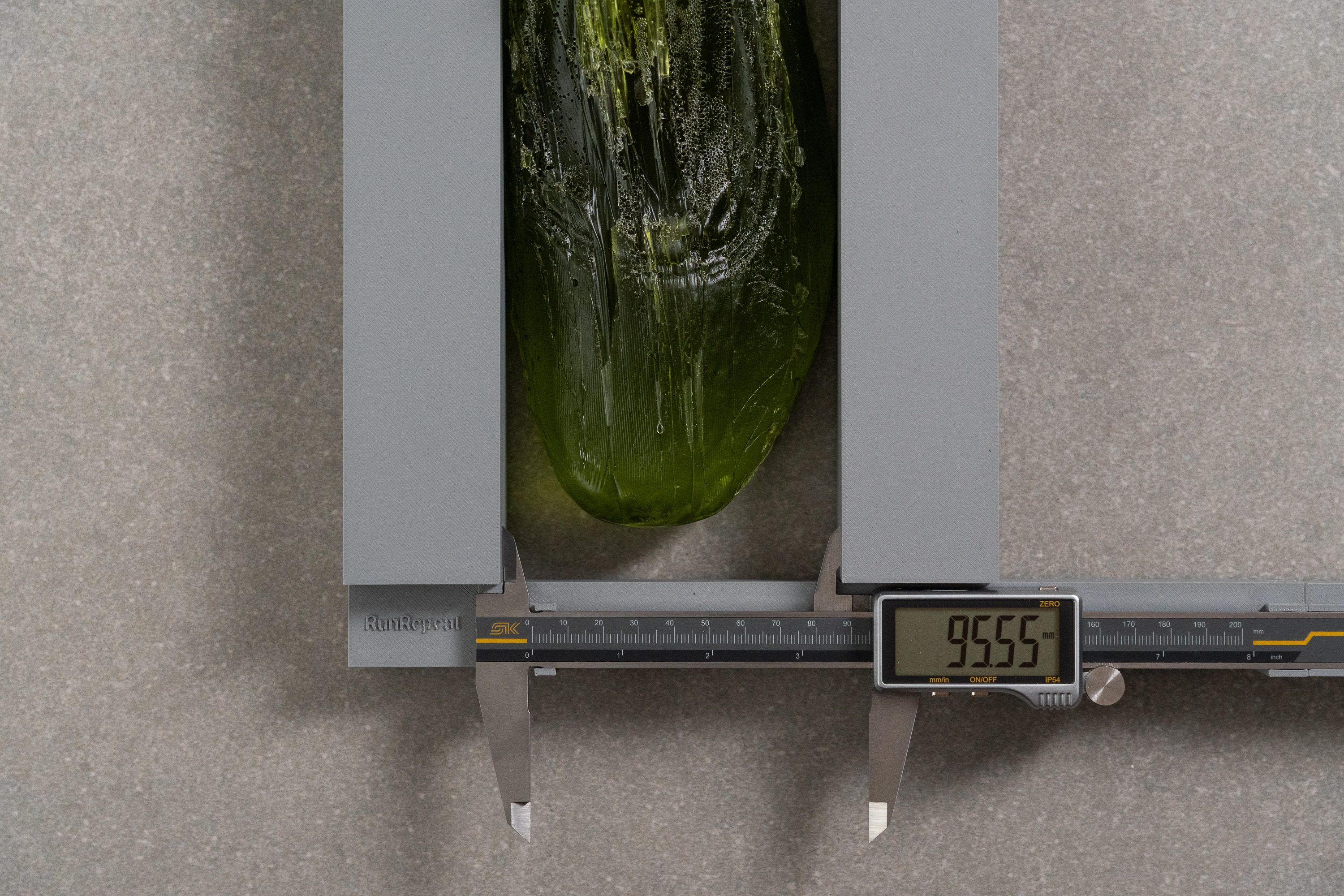
| Gel Challenger 15 | 95.6 mm |
| Average | 92.9 mm |
Toebox width
The big toe area, on the other hand, proved to be more in line with the average at 69.8 mm. It keeps the Challenger 15's fit within the medium range.
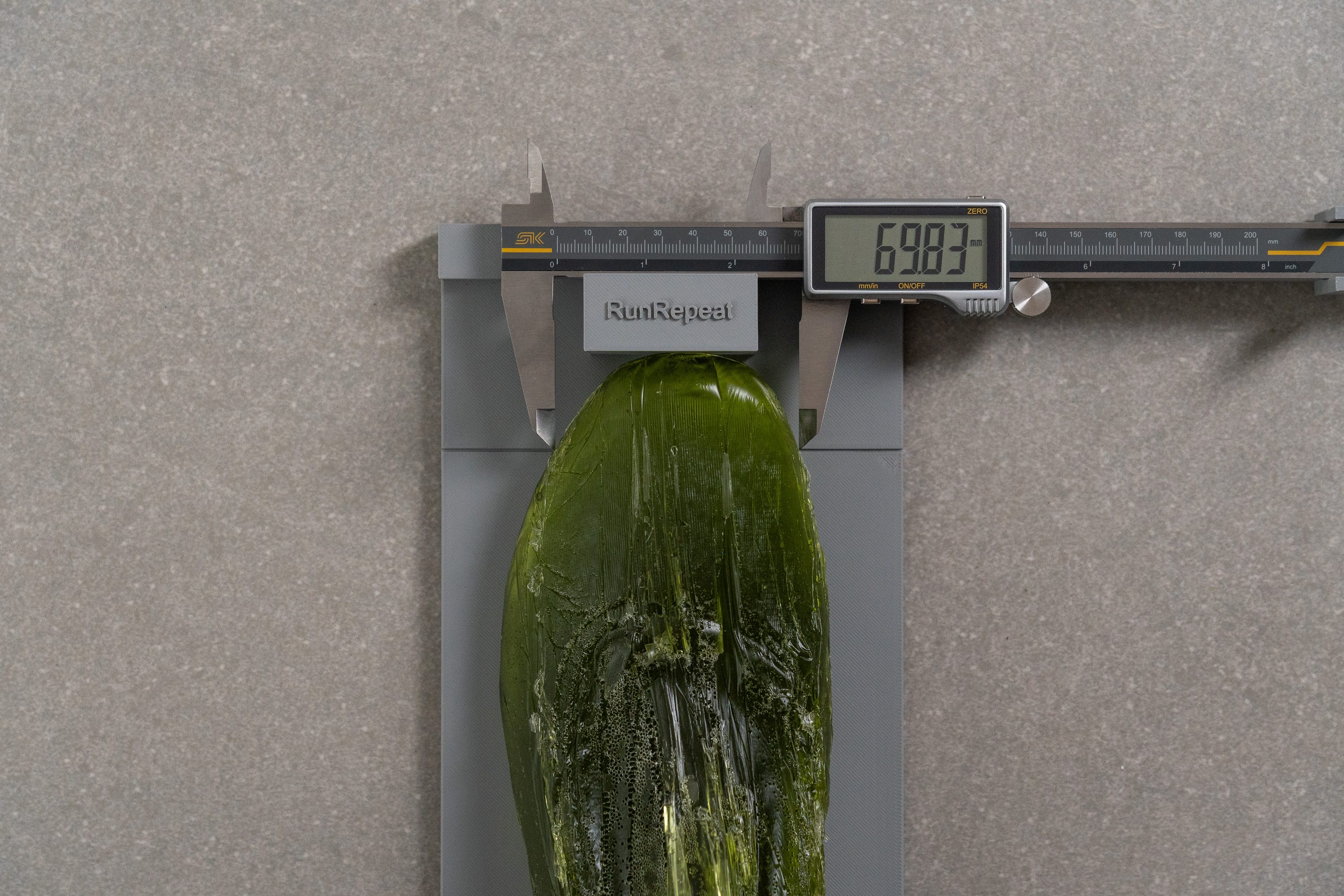
| Gel Challenger 15 | 69.8 mm |
| Average | 69.2 mm |
Toebox height
We also found the shoe's vertical space to be adequate and unrestricting.
With a toebox height of 24.0 mm, it's not too low to the toes to cause pressure or aggravate toe-related conditions.
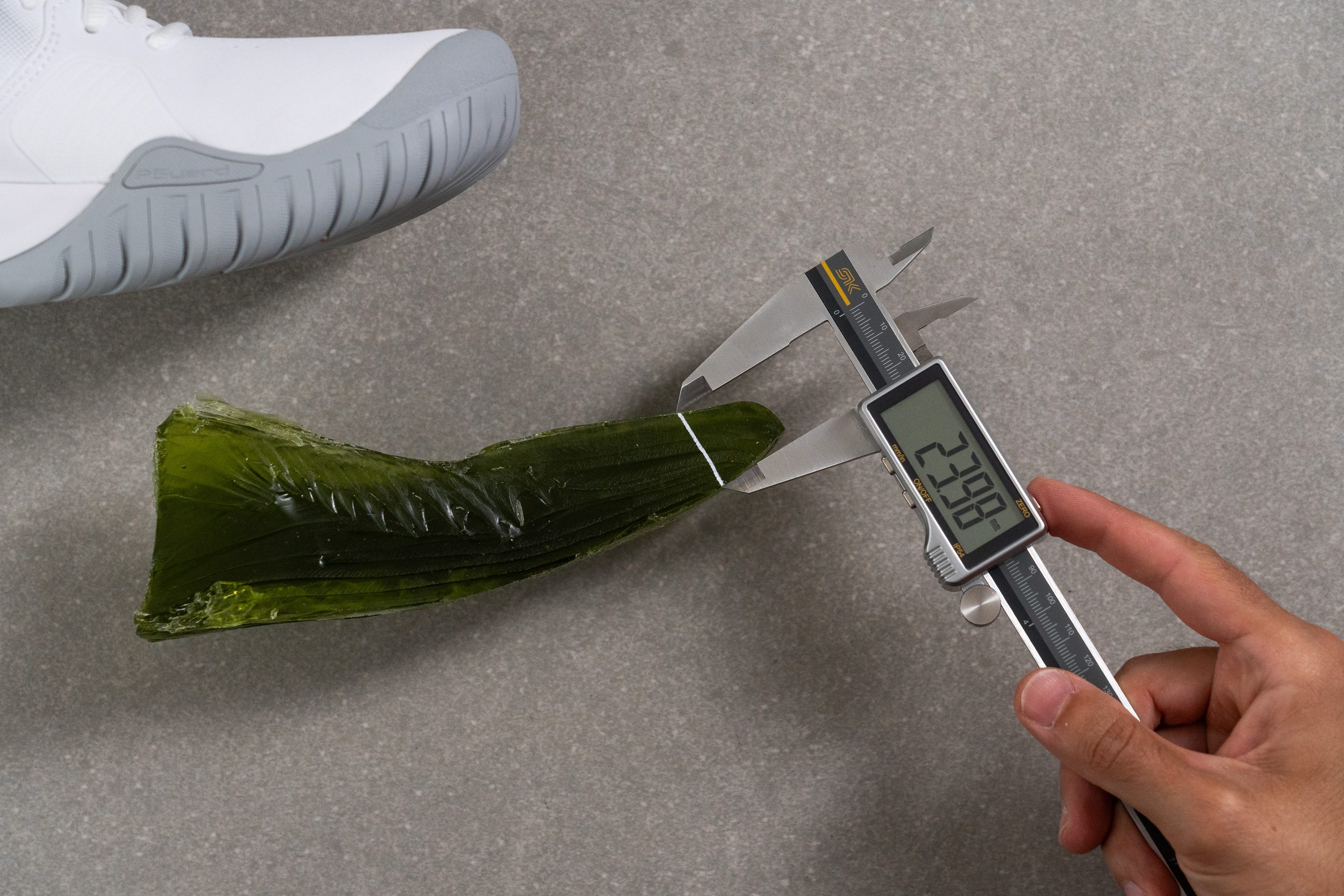
| Gel Challenger 15 | 24.0 mm |
| Average | 25.1 mm |
Traction / Grip
Forefoot traction
Don't let the shoe's below-average friction coefficient of 0.58 fool you because the Challenger 15 never felt slippery or unreliable on hard court!
Even though it sits on the lower end of the tennis shoe spectrum, this ASICS shoe grabbed the court well enough to keep us surefooted, while offering enough give to accommodate gliding and sliding footwork.
| Gel Challenger 15 | 0.58 |
| Average | 0.75 |
Outsole design
Examining the Challenger 15's outsole design, we found that its traction pattern is identical to that of the Resolution X! Also, both shoes employ the brand's acclaimed AHARPLUS rubber in the heel area for added durability.
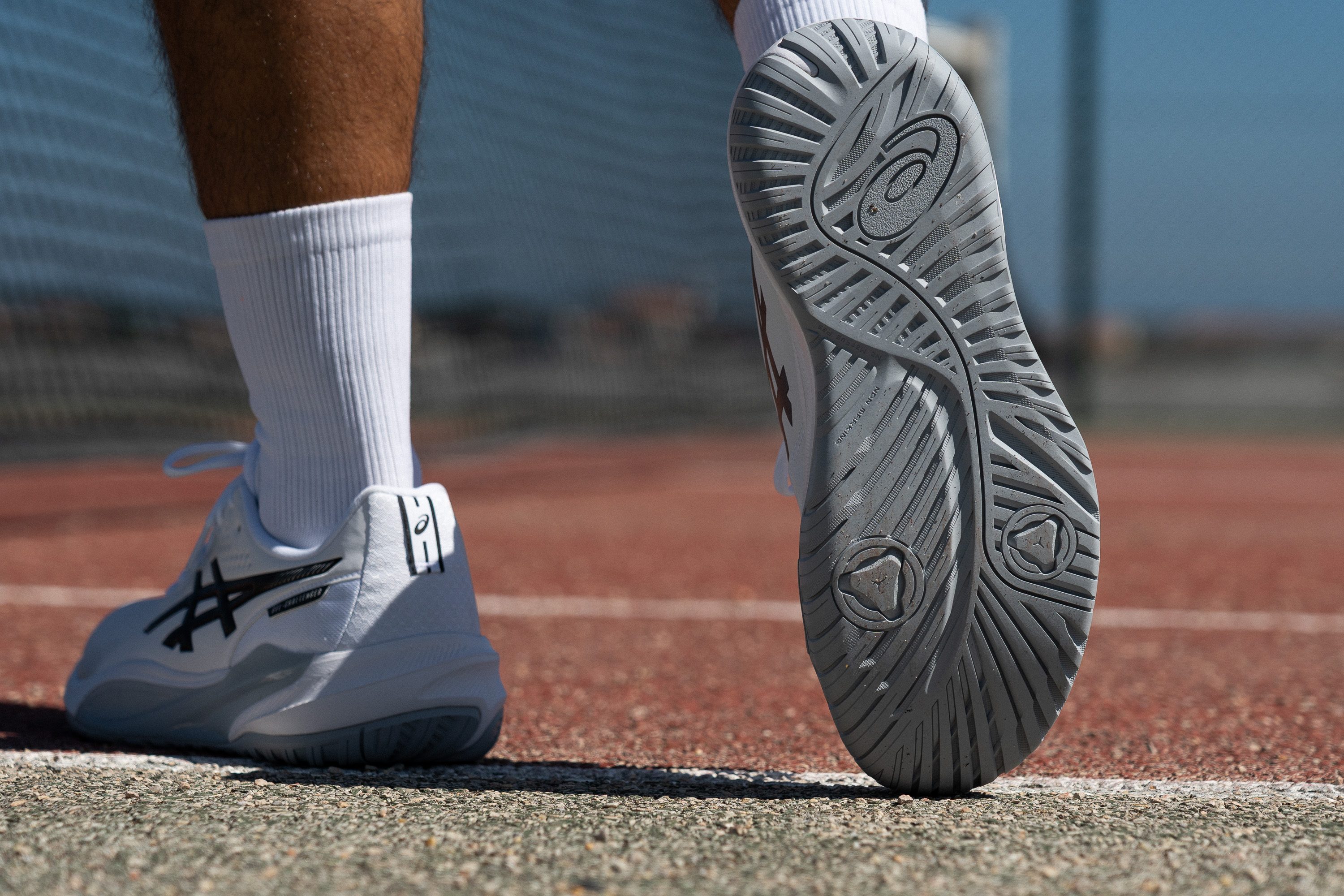
Flexibility / Stiffness
With its reimagined WINGWALL design, the Challenger 15 gained a bit more stiffness in the forefoot area. Our shoe bending tester recorded that the newer version requires 13% more force to bend by 30 degrees (18.7N as opposed to 16.6N).
While this update hasn't altered v15's maneuverability that much, it contributed to the shoe's stability.
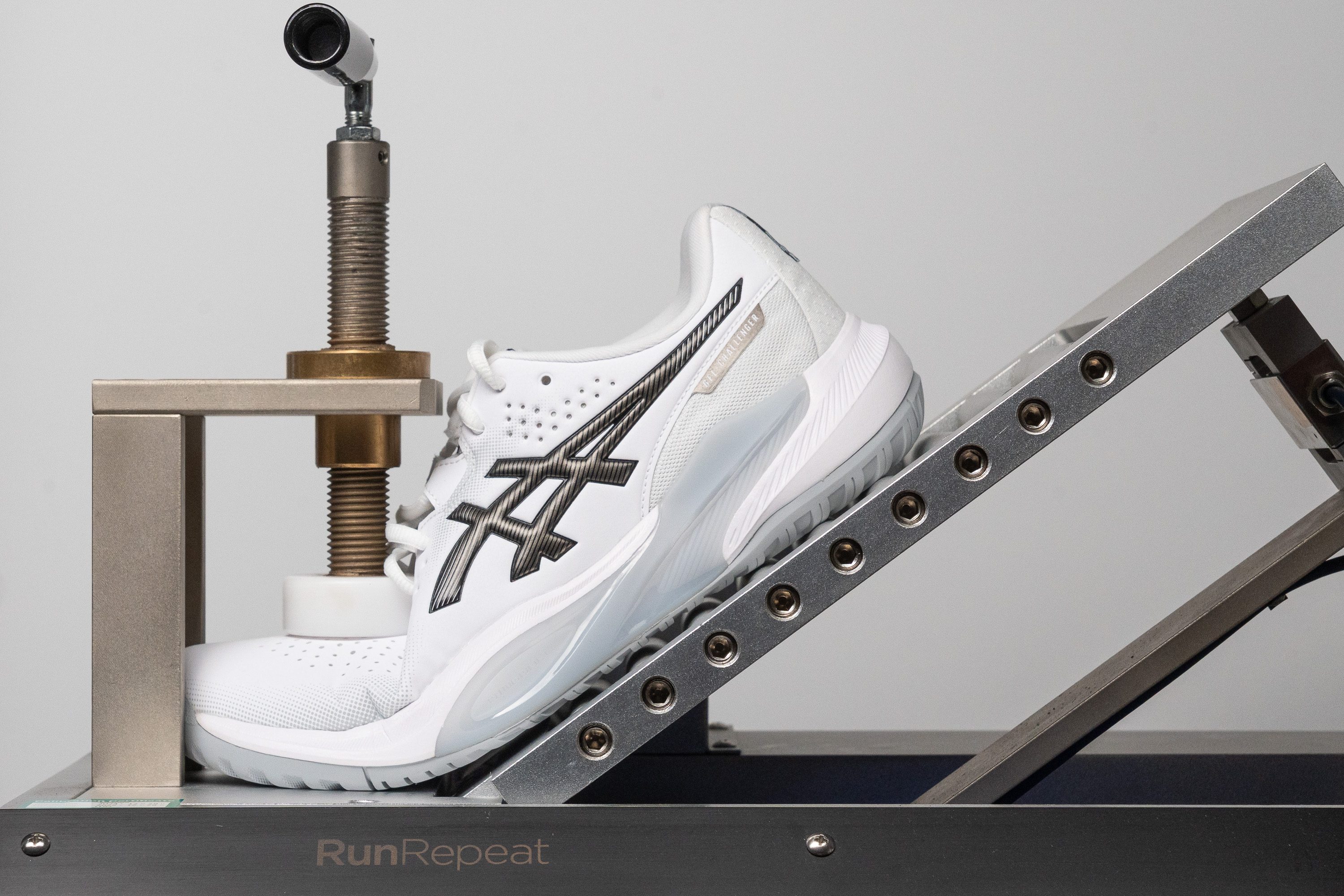
| Gel Challenger 15 | 18.7N |
| Average | 16.6N |
Weight
As a new 'Mini-Me' of the ASICS Gel Resolution, the Challenger 15 also gained some heft to match its bigger brother.
Jumping from 12.5 oz (354g) to as much as 14.0 oz (395g) in a men's US size 9, the shoe made clear sacrifices to enhance stability.
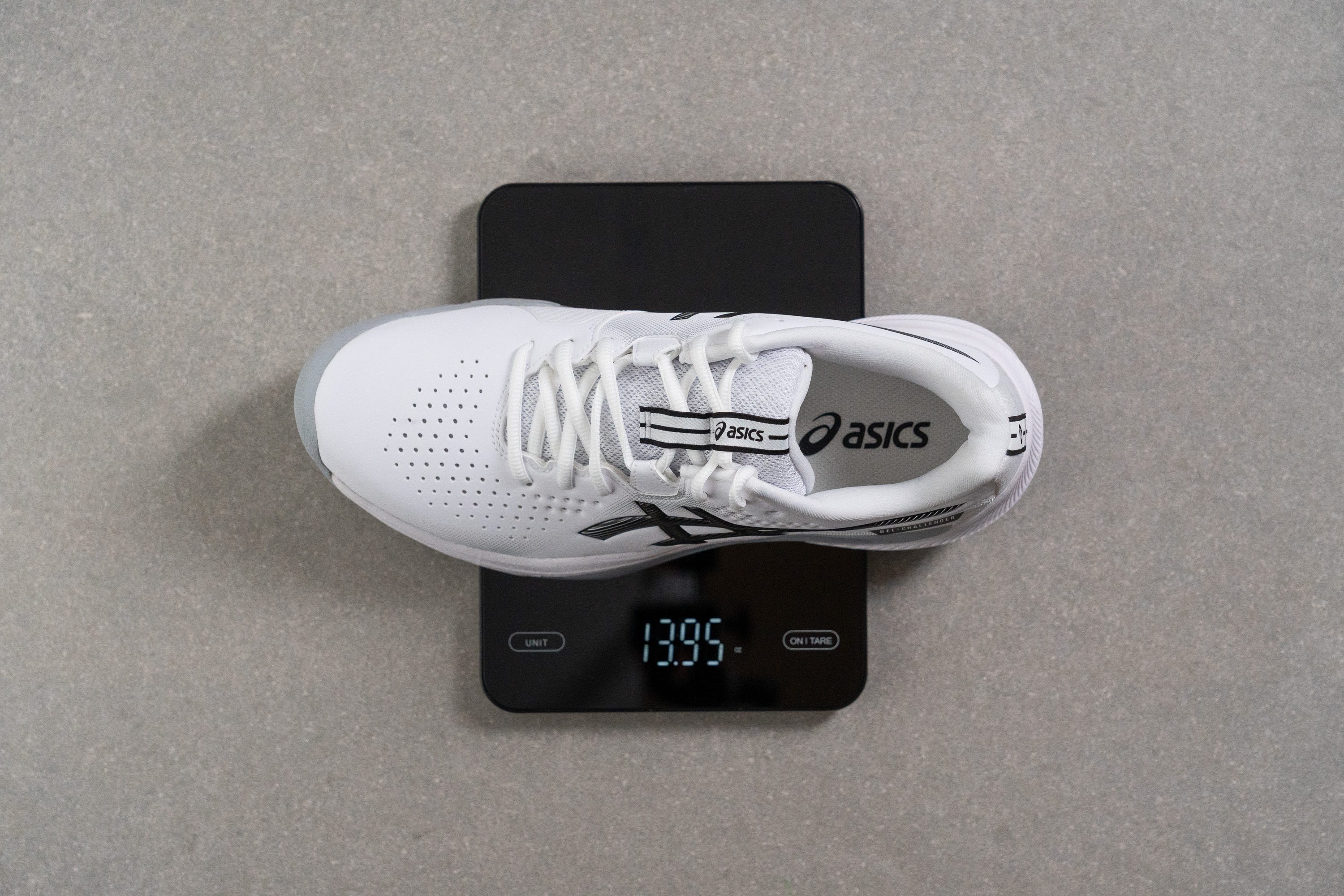
| Gel Challenger 15 | 13.9 oz (395g) |
| Average | 12.8 oz (363g) |
Breathability
Refusing to expose the shoe's upper mesh, ASICS went for a synthetic leather upper in the Challenger 15 yet again.
Thankfully, the brand added perforations throughout the entire upper to keep the airflow coming.
But these tiny apertures can only do this much compared to an open mesh.
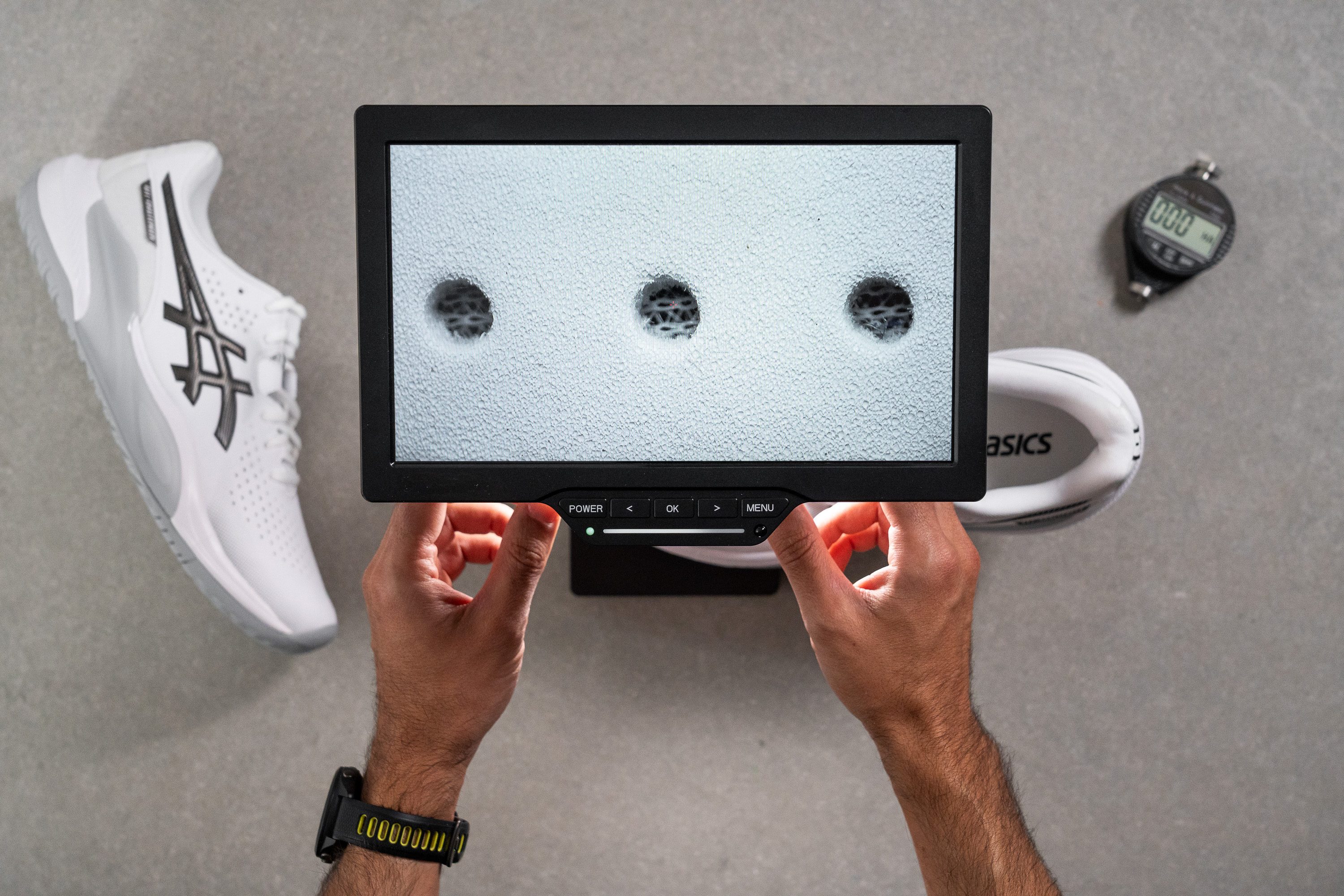
In other words, don't expect a ton of ventilation in the Challenger 15 because the shoe is only one point away from being hot and stuffy.
We assessed its breathability with a low, below-average score of 2 out of 5.
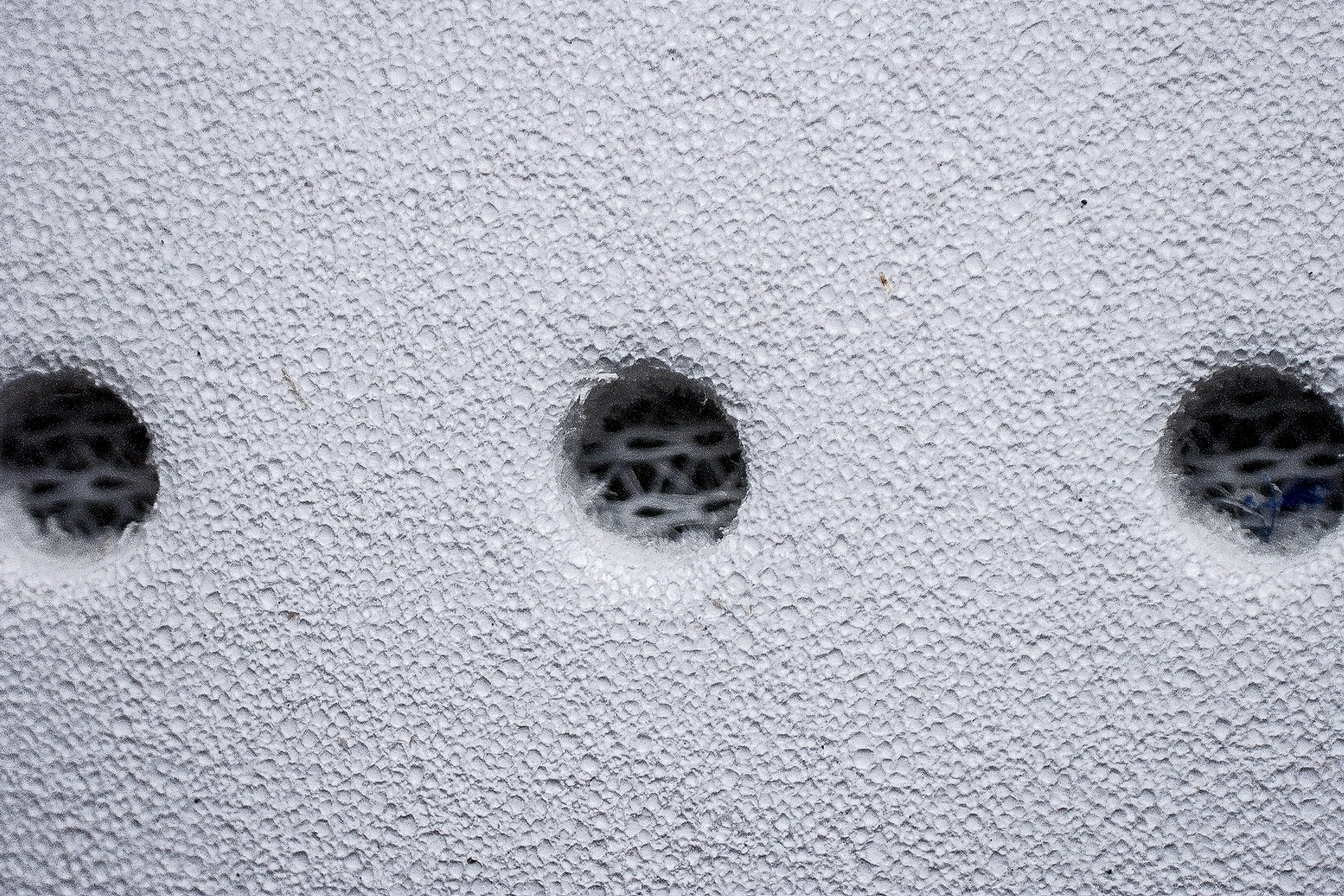
| Gel Challenger 15 | 2 |
| Average | 3.1 |
Stability
Lateral stability test
Believe it or not, but this affordable ASICS shoe might as well become some players' alternative update to the Resolution 9! Especially if they are disgruntled by the polarizing X edition.
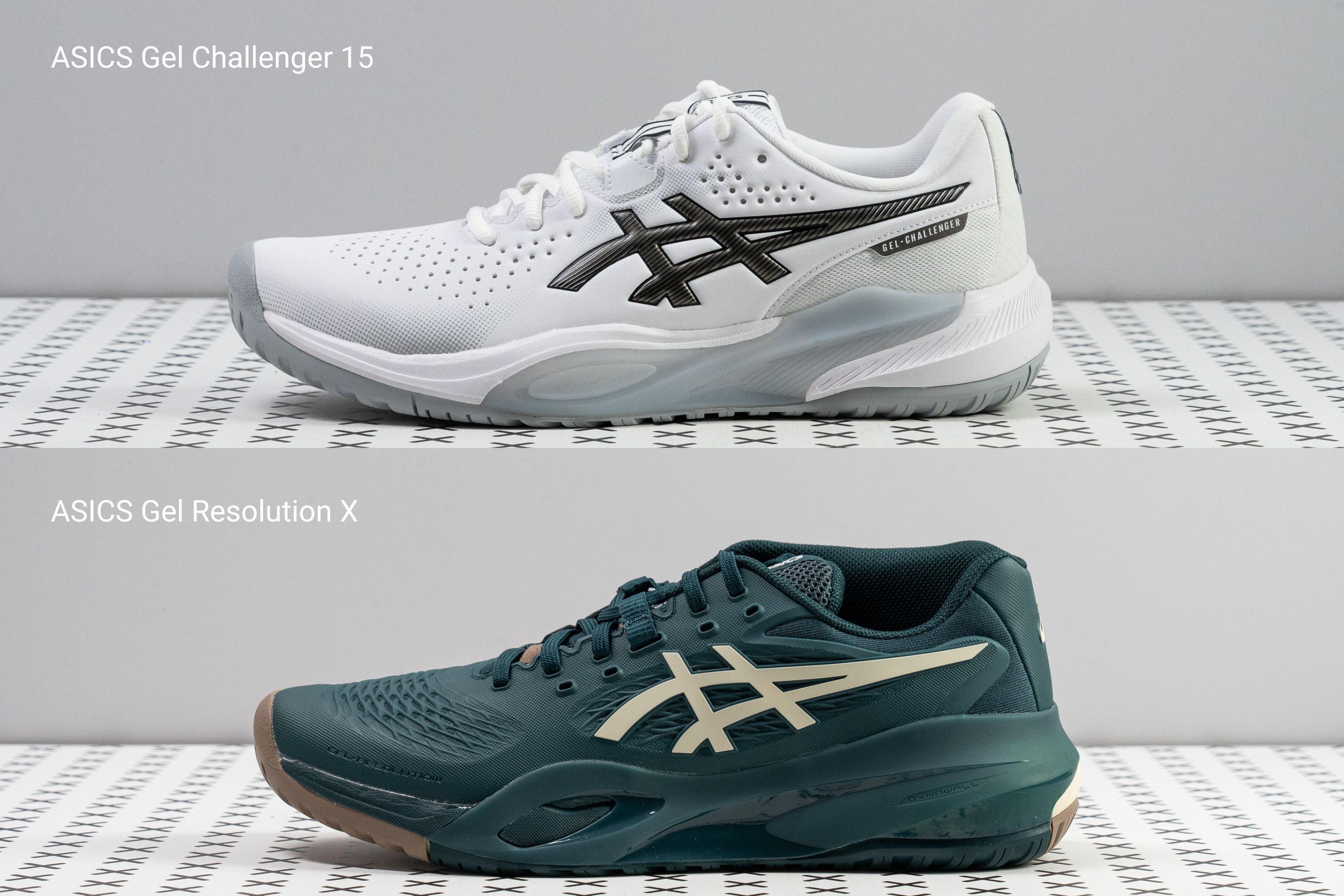
The Challenger's redesigned WINGWALL cage evidently pulls cues from the X's DYNAWALL but in a more streamlined, minimal manner.
And the result? A highly stable yet more budget-friendly shoe for the baseline grinders and folks with overpronation.
Torsional rigidity
Although it is not marketed as a premium stability shoe, the ASICS Gel Challenger 15 is virtually impossible to twist!
Its stiff TPU walls, firm midsole, and synthetic upper all work together to resist torsion like there is no tomorrow, earning the shoe a maximum stiffness score of 5 out of 5.
| Gel Challenger 15 | 5 |
| Average | 4.4 |
Heel counter stiffness
The shoe's support wouldn't be complete without a super-rigid heel counter. Unyielding and heavily padded, it refused to fold or bend under the pressure of our manual test, scoring another 5 out of 5 for stiffness.
The Challenger 15's mighty heel counter offers nothing less than a death grip around the heel and ankle, locking them in as securely as technically possible.
| Gel Challenger 15 | 5 |
| Average | 4.1 |
Midsole width - forefoot
Flipping the shoe upside down, we could see why ASICS promised a 'larger contact area' in the product description. The shoe's base broadened by a good 4.5-6.5 mm!
The widest part of its forefoot clocked in at 115.0 mm, forming a notably larger outrigger compared to the v14.
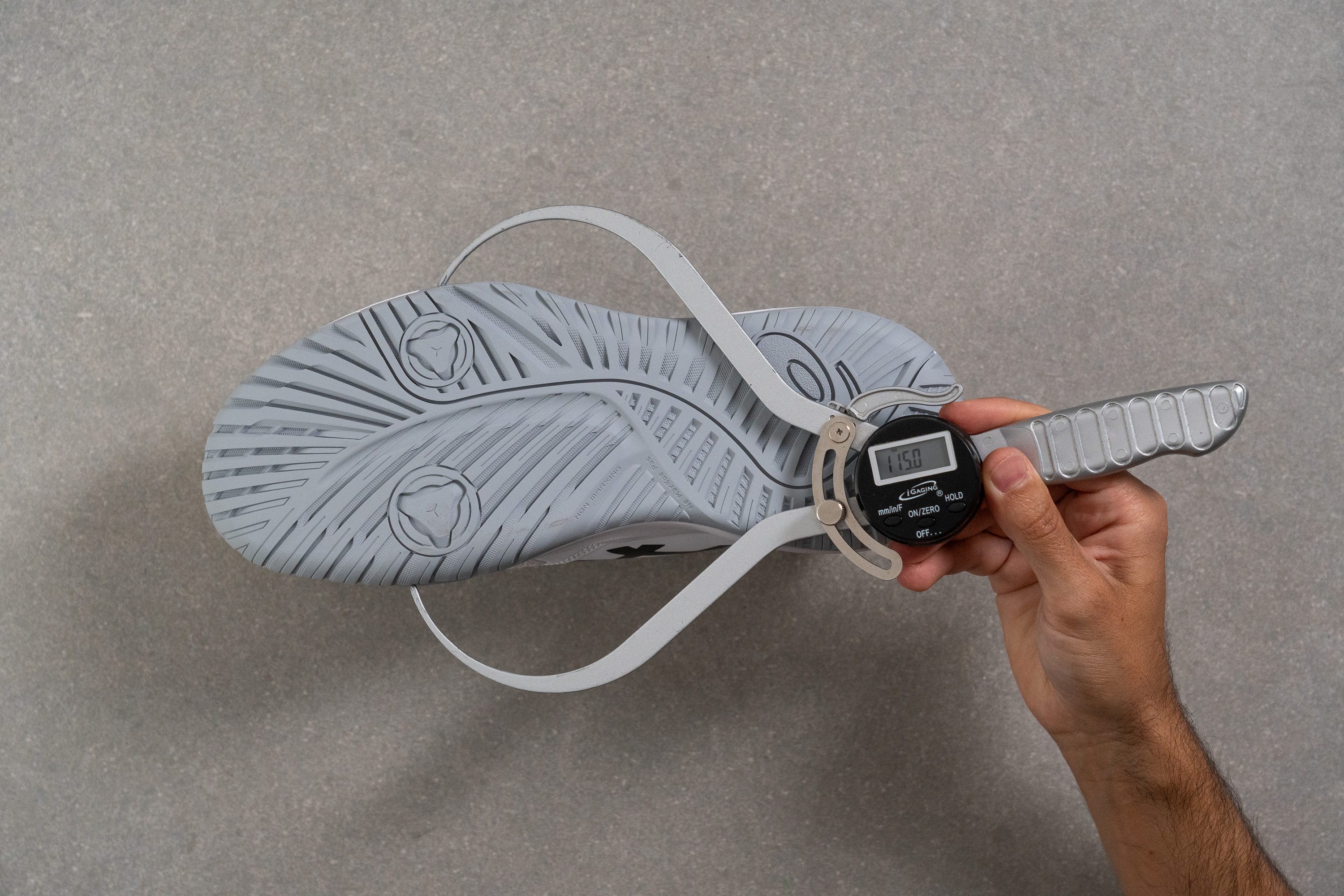
| Gel Challenger 15 | 115.0 mm |
| Average | 112.0 mm |
Midsole width - heel
But it's the heel that makes an even bigger difference, showing as much as 94.9 mm in its widest area.
In fact, the Challenger 15's midsole dimensions are now similar to those of the Resolutions! That means even more stability through a wider base for landing and pushing off.
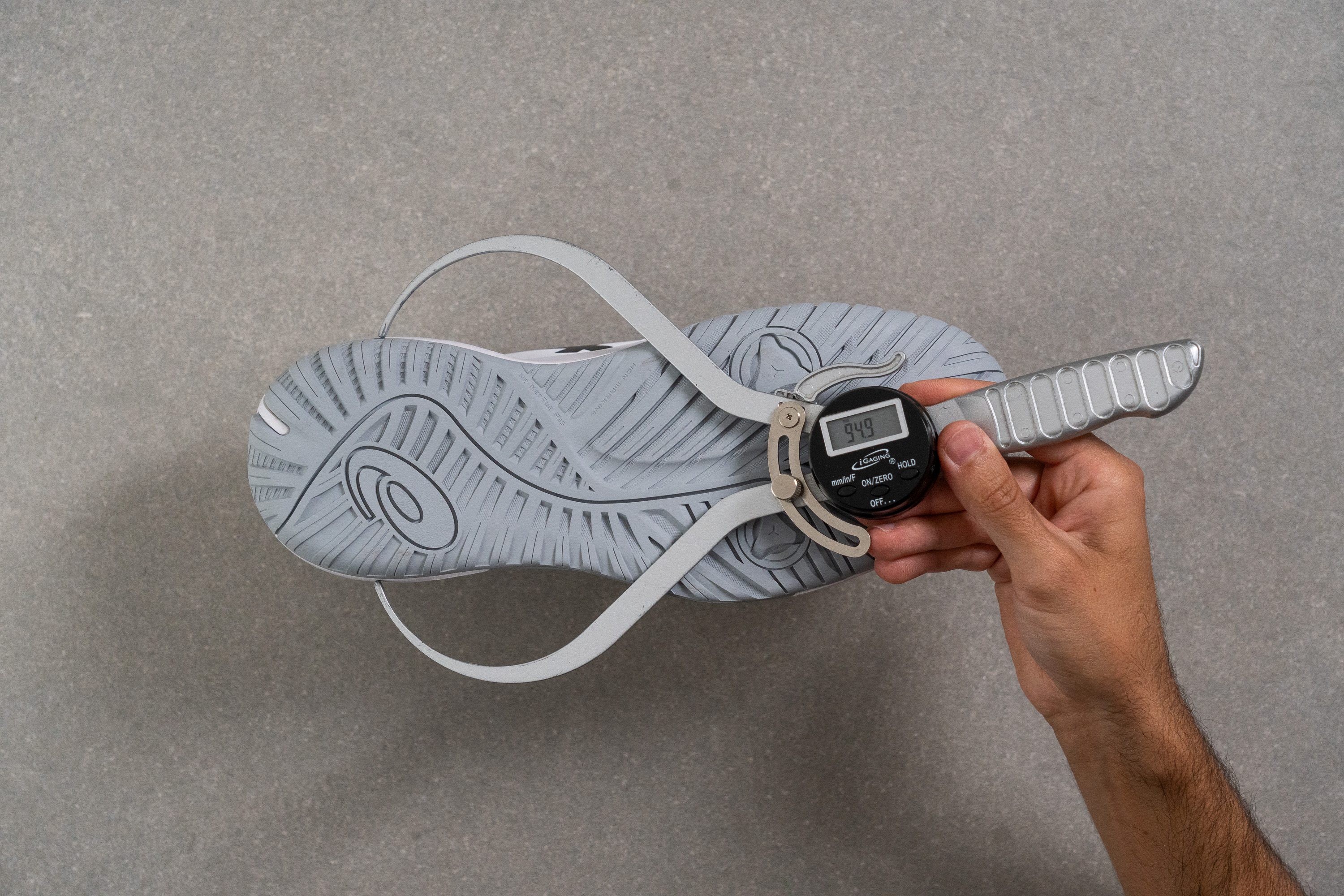
| Gel Challenger 15 | 94.9 mm |
| Average | 89.6 mm |
Durability
Toe guard durability
But the Challenger 15's claim to fame doesn't end there. The shoe also proved to be remarkably durable!
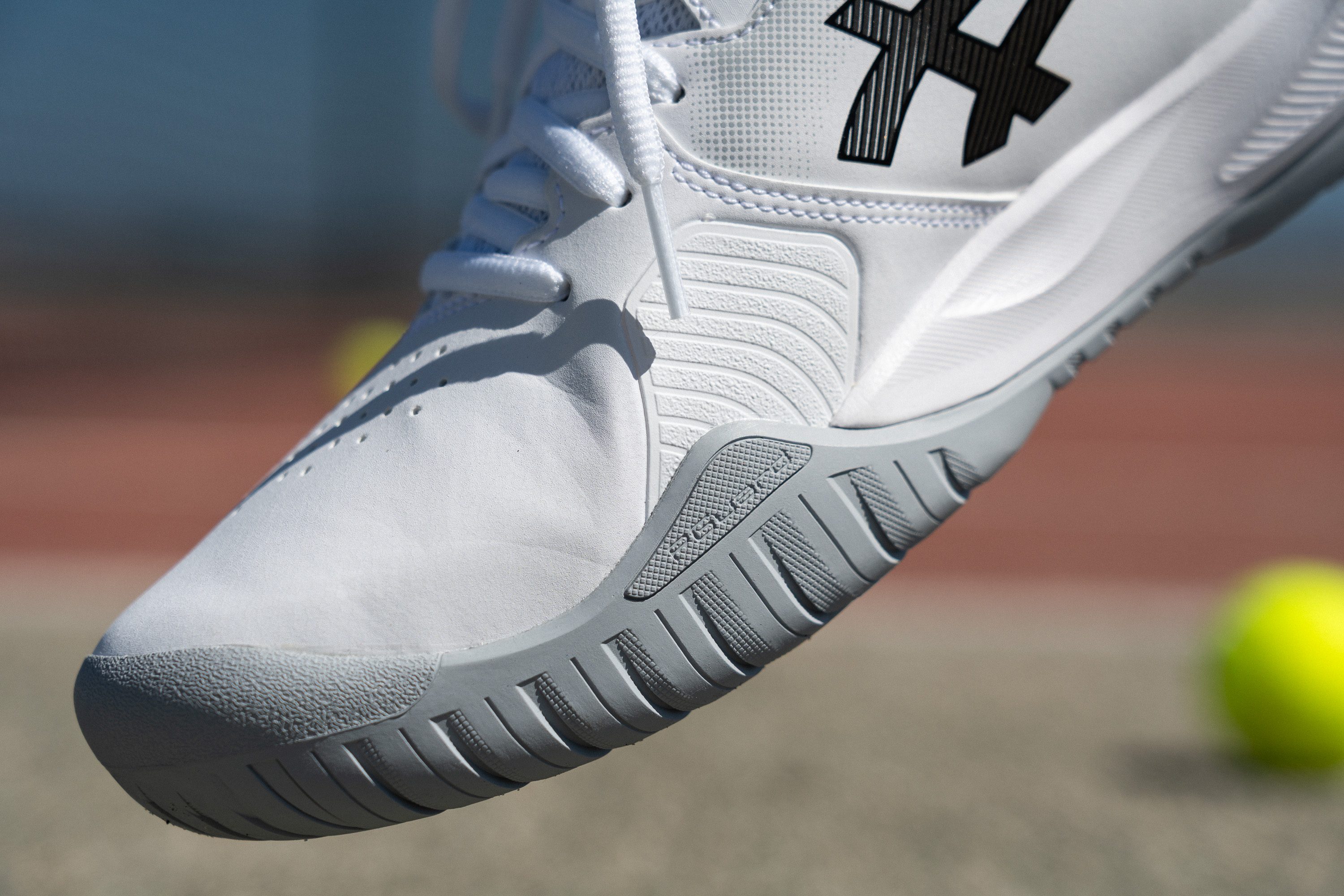
Its PGuard toe drag guard appears to be identical to the one we found on the premium ASICS shoes.
Taking this protective piece through our demanding Dremel test confirmed our high expectations with a maximum durability score of 5 out of 5! The Challenger 15 is not afraid of aggressive toe drags and slides on hard court.
| Gel Challenger 15 | 5 |
| Average | 3.4 |
Toebox durability
Fully covered in synthetic leather, the Challenger 15 promises to last longer than a typical tennis shoe with a mesh upper.
Having drilled the top of its toebox for 12 seconds, we found that the material quality has improved significantly from the previous version. This ASICS shoe's toebox durability deserves nothing less than 4 out of 5!
| Gel Challenger 15 | 4 |
| Average | 3.7 |
Heel padding durability
Just by looking at it, we could see how tough the shoe's synthetic lining is! The material didn't even flinch when we touched it with the sandpaper tip of our Dremel!
This sounds like a promising interior durability that deserves the highest score of 5/5. A world of difference from the past version, and great news for players who wear out the insides of their tennis shoes faster than the exterior.
| Gel Challenger 15 | 5 |
| Average | 3.3 |
Outsole durability
The brand's acclaimed AHARPLUS rubber also proved its worth in our outsole durability test.
Sustaining a dent of merely 0.6 mm, the Challenger 15 proved its similarity to the brand's premium shoes yet again.
| Gel Challenger 15 | 0.6 mm |
| Average | 0.8 mm |
Outsole thickness
The amount of rubber used for this ASICS shoe's outsole also looks quite reassuring at 4.1 mm.
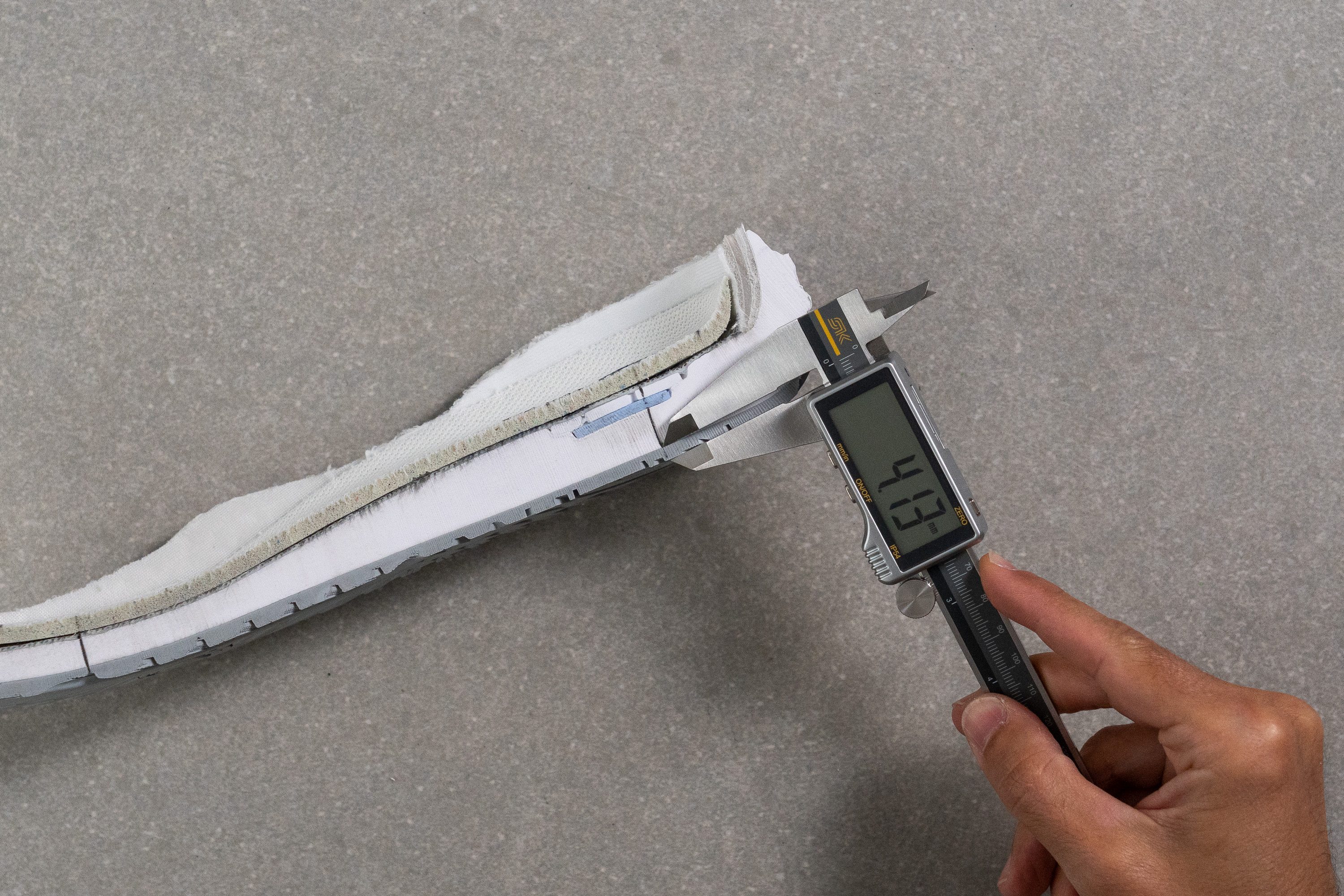
| Gel Challenger 15 | 4.1 mm |
| Average | 4.2 mm |
Misc
Insole thickness
The Challenger 15's insole is adequately padded with a thickness of 4.7 mm in the heel.
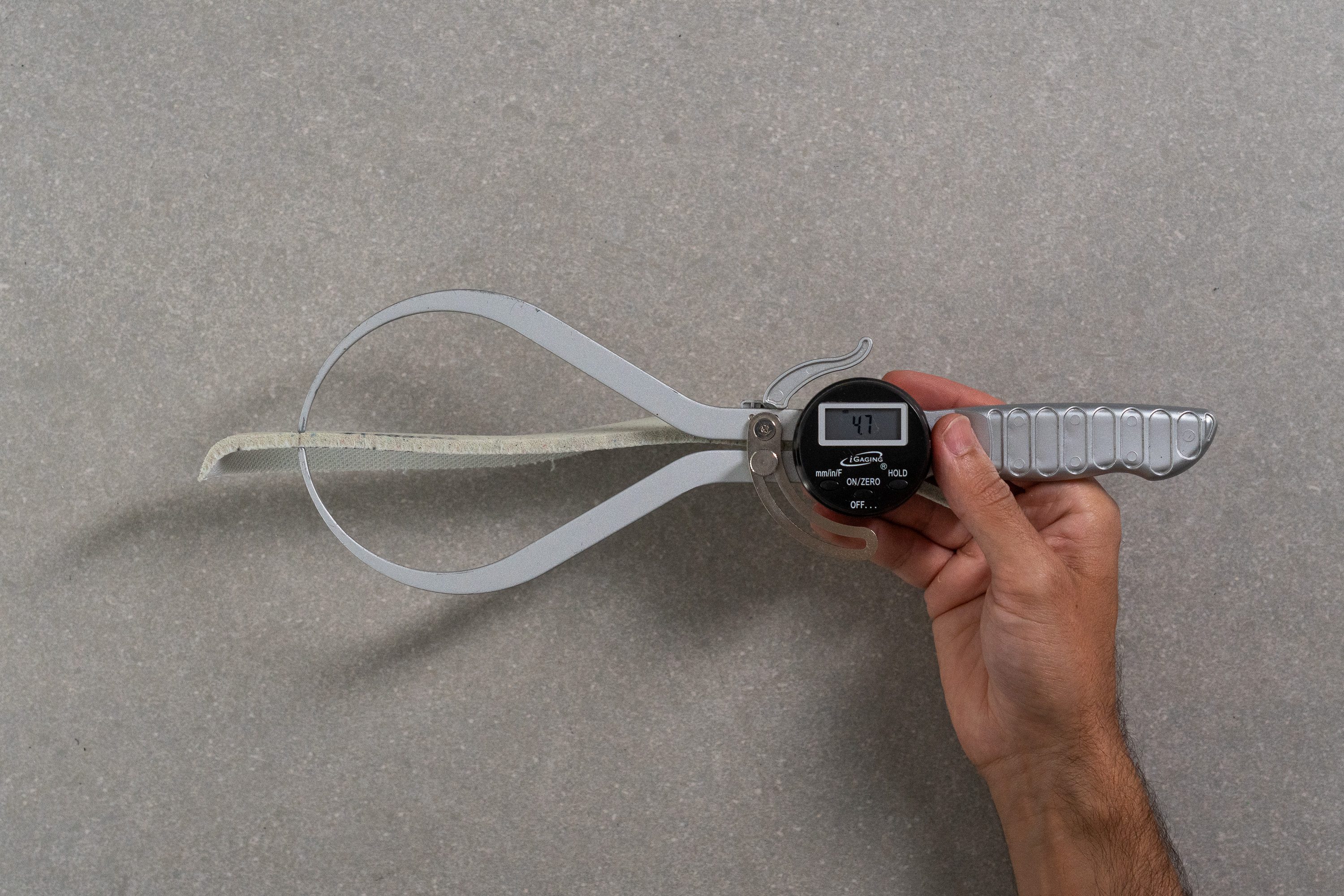
| Gel Challenger 15 | 4.7 mm |
| Average | 5.1 mm |
Removable insole
We found the shoe's contoured Ortholite insert to be of good quality and rather comfortable against the foot. But it can also be removed and replaced with a custom orthotic if needed.
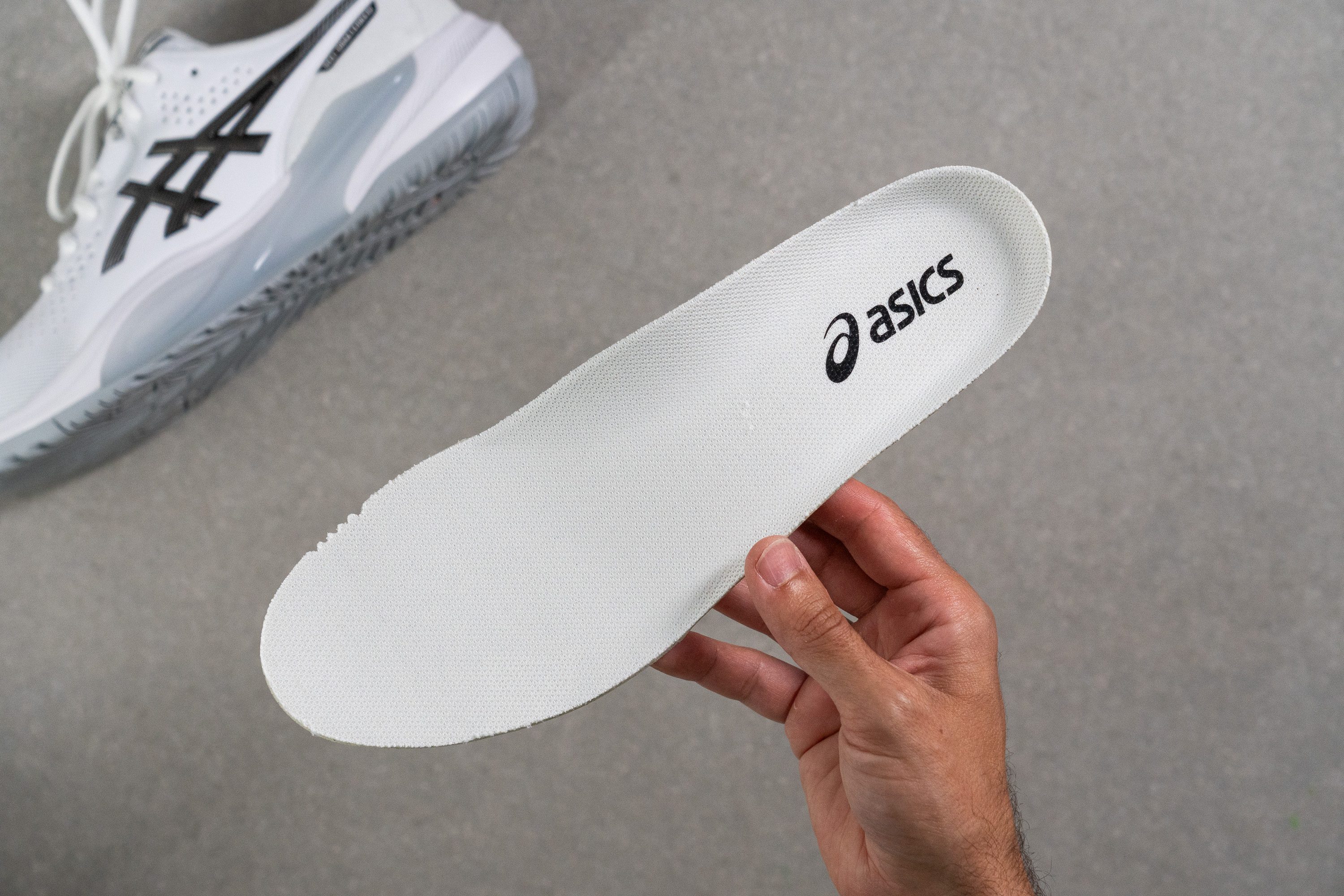
| Gel Challenger 15 | Yes |
Tongue padding
A ton of interior foam padding makes the ASICS Gel Challenger 15 as comfy (and heavy) as it gets.
The new iteration bulks up the collar and tongue, reaching a thickness of 13.3 mm in the latter! As long as you are fine with the extra weight it brings, your feet will be treated to a very cozy and secure step-in feel.
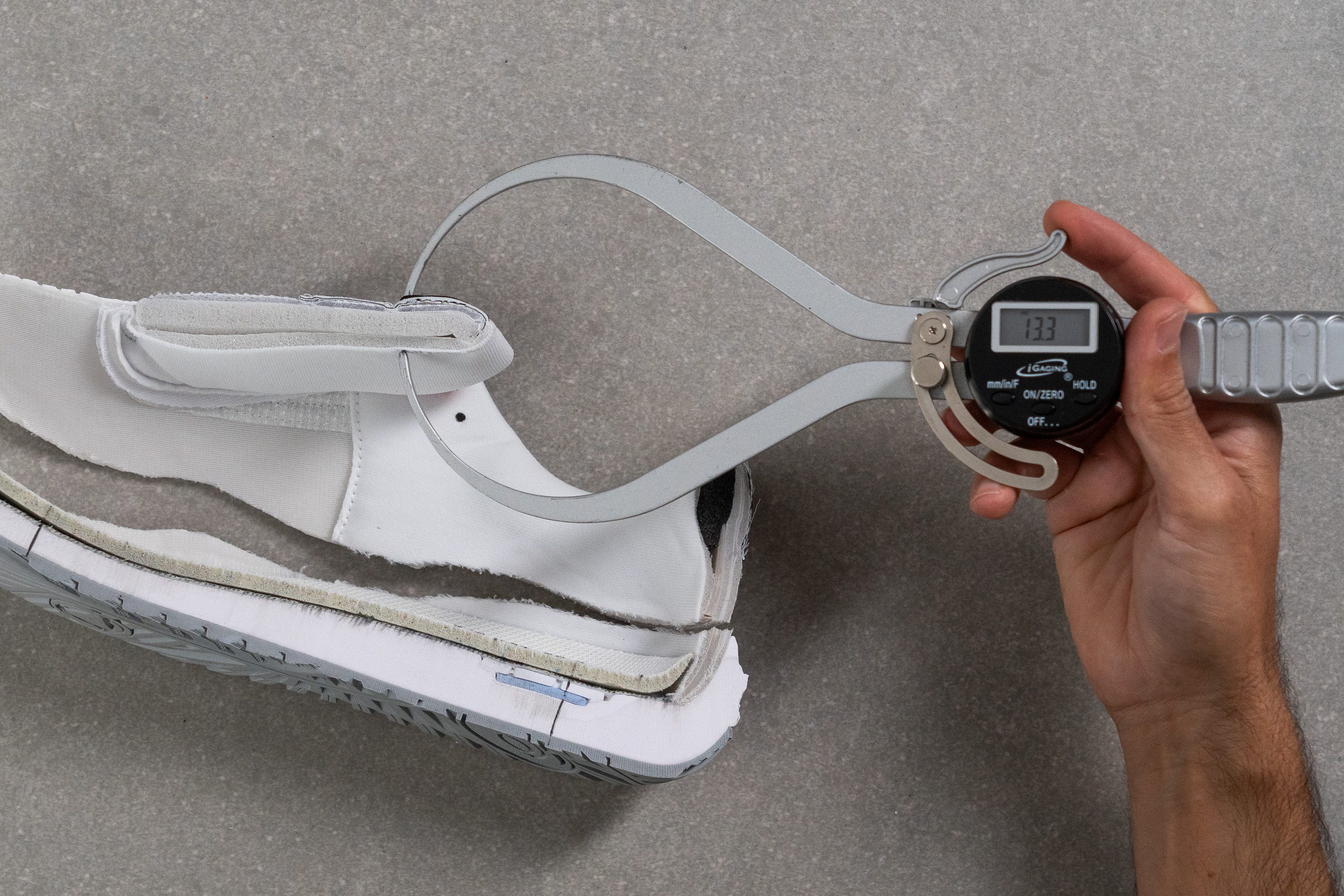
| Gel Challenger 15 | 13.3 mm |
| Average | 8.3 mm |
Tongue: gusset type
There are no gussets on the shoe's tongue, but we are not so concerned about it shifting and sliding, given how much padding it carries.
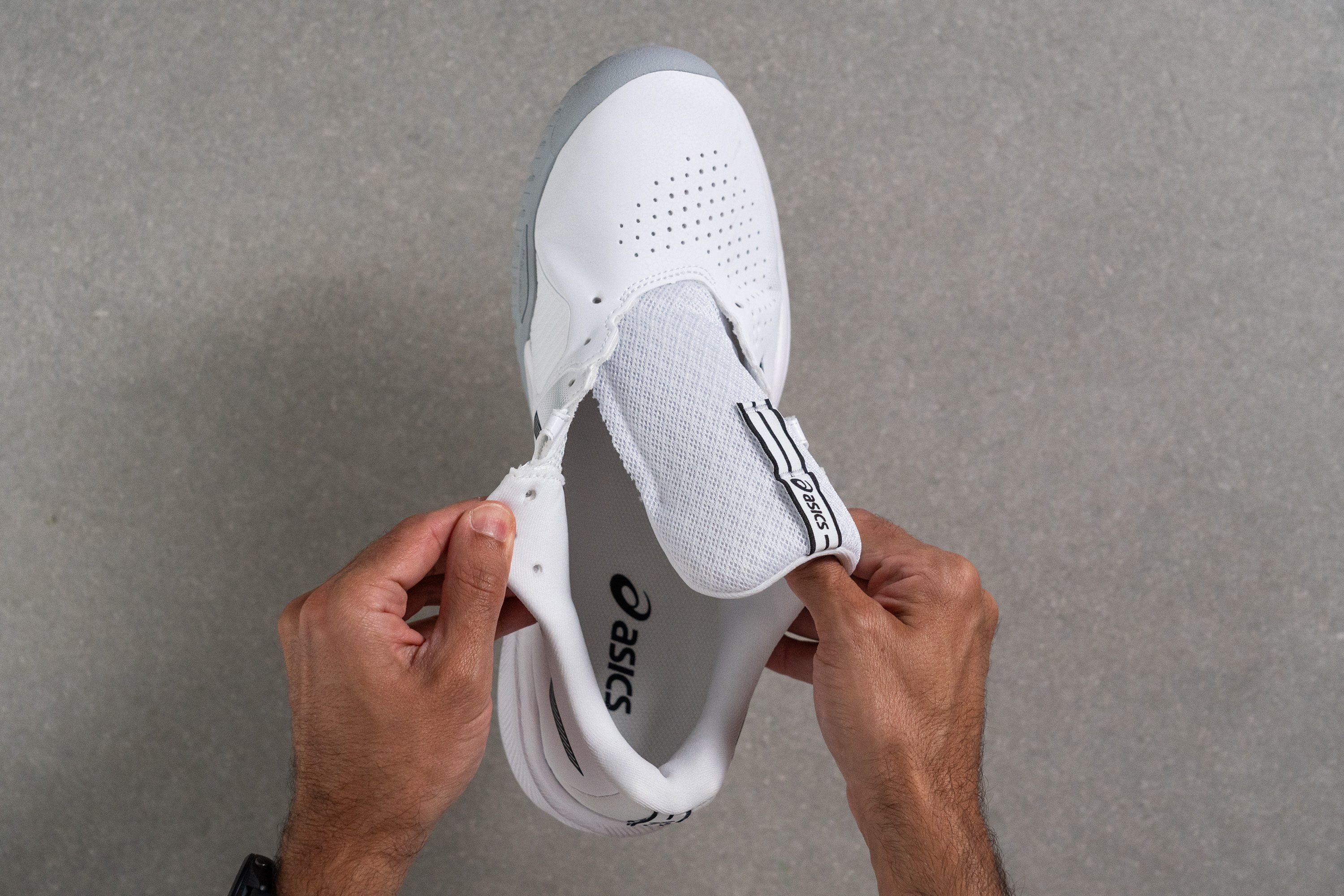
| Gel Challenger 15 | None |
Price
ASICS made several quality improvements to the new Challenger 15 without even a minor price hike! We can't stop raving about how much value this tennis shoe brings to the court at such an affordable price point.
Comparing its lab test results to the Resolution X, we found that the quality gap between the two shoes is much smaller than the $50 difference in their retail prices.
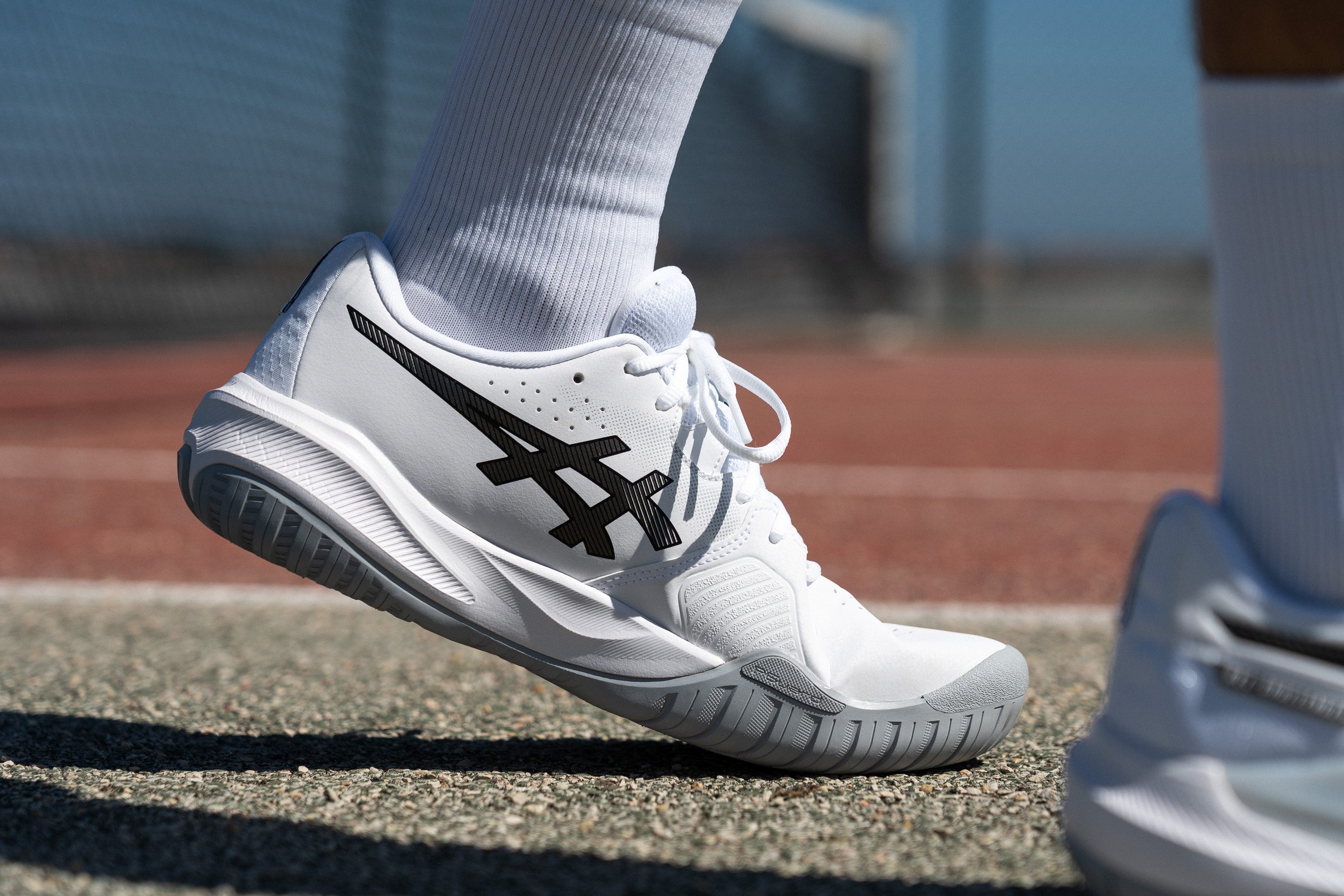
| Gel Challenger 15 | $110 |
| Average | $132 |
Heel tab
A small fabric finger loop at the back of the shoe's collar helps with the shoe entry.
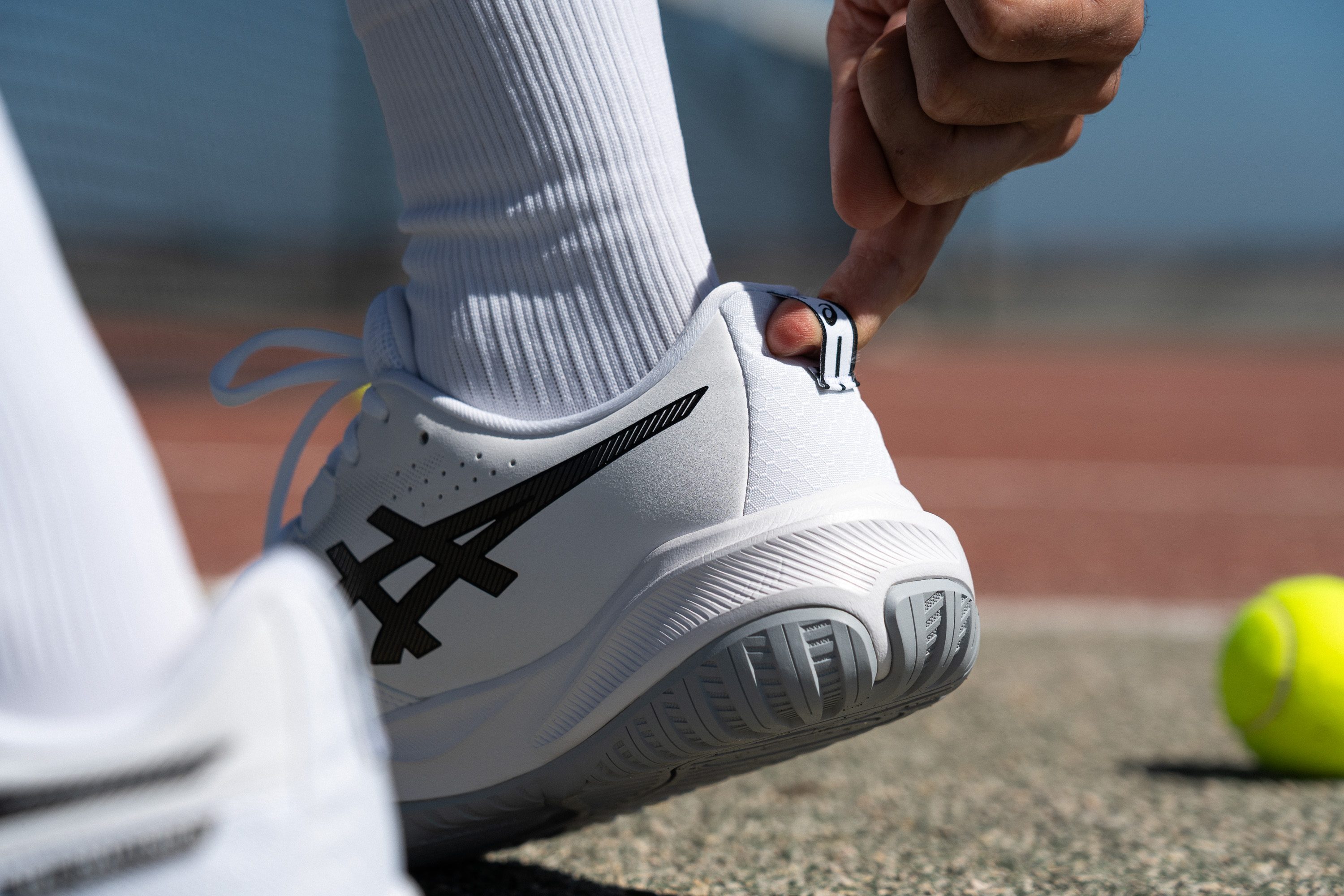
| Gel Challenger 15 | None |

